#cannot be explained in any other context
Explore tagged Tumblr posts
Text
an open letter to those who have not yet shifted.
i don't know how many of you will see this, let alone how many will read it entirely. this letter is for those who have been trying to shift for two years, five years, more. those who cannot give up, and those who will not give up, and maybe even those who already have. to preface, this letter will not rehash everything you already know. you've scrolled every forum, you've seen every method, you've read every tip. you've trialed, and errored, and persevered... but you're still here. law of assumption, manifestation, belief, intention. but you're still here. you've been told all about shifting... right? you already know what shifting is... right? you should already know how to shift... right? but you're still here.
this letter is not intended to debase or invalidate those who do already believe in those things and who are satisfied with that. this is for those who have been trying that way for 2 years, 5 years, and more, and still haven't shifted. this is for those who might want an alternative perspective.
what you've been told
in my personal opinion, the online shifting community as it currently stands is very... rigid. narrow. there are a few dominant views, and then the many who drown out any possible dissent or disagreement. i do understand why this happens. reality shifting is already a marginal belief, hounded by anti-shifters and disbelieved and debunked on all sides, so it makes sense that people feel the instinct to close ranks at any sign of an outsider. unfortunately, this has led to a community that raises its hackles at even other reality shifters who simply don't believe the exact same way that you do. law of assumption. manifestation. intent. (and dare i say it, the multiverse.)
i don't believe in any of that, in the context of shifting.
now, wait! don't go yet, stay with me. it's okay if you do. i'm not intending to change the minds of those who already believe in these things. i'm not going to go at anyone and say "i'm right, you're wrong, and you must change your mind to agree with me!" that would be silly, and counterproductive. let's lower our guards, and extend an olive branch, please. if you feel these things serve your journey, then carry on. you're allowed to disagree with me, i won't be upset. you're allowed to think i'm wrong, if you want. literally no worries at all.
but i am a little tired frankly of certain ideas being treated as the only options, and often in a rude or hostile manner. if you are someone who has spent five years trying to shift, and you see yet another post that boils down to "all you have to do is want it hard enough" does that not hurt your soul? the following sections of this post are for those who these ideas have not been working for. for those who have not yet shifted. it's been two years. five years. more. and you're still here. are you open to another possibility?
what is reality shifting?
i've told you what i don't believe, but what about what i do? i'll try to keep this as concise as possible for the sake of brevity and comprehension, knowing i could potentially clarify in future posts. but please continue with the understanding that im a chronic overexplainer, and my curse is the fact that the extra words don't always actually increase understanding. bear with me.
reality shifting: broadly speaking, this refers to shifting your linear experience of reality from one, to another. this has been known by many other names in the past, across continents and cultures, even in pre-agriculture societies. i'd include ideas like persistent realms, quantum jumping, focus 21, etc. language is subjective, and people may describe or understand the same experience in different ways.
i believe reality shifting is a haphazard side effect of our limited ability to perceive and comprehend reality. let me explain. space, as we understand it, is three dimensional. but reality isn't. it's our bodies and minds limiting our perception and understanding that makes all of reality seem that way to us at surface level.
1D: let's consider a hypothetical one dimensional existence. everything would a straight line, and the only way to perceive anything else would be as a single point directly in front or directly behind you. forwards and backward. the 2D and 3D are beyond your limited ability to physically sense or feel, let alone to comprehend. Forget about the 4D (time). due to your lack of comprehension, you cannot move at will in two dimensional planes, let alone three dimensional space or even time. you are static, a single point.
2D: let's consider a hypothetical two dimensional existence. it would be a flat, infinite planar expanse. you might be a square, or a circle. you can move freely in two dimensional directions (forward, backwards, side to side), but not in the 3D. No up, no down. If you tried to perceive a three dimensional object, you would only be able to comprehend it as linear, a line on the horizon where it intersects your 2 dimensional plane. you would perceive the 3D as moving around or within you on its own, without the ability to direct it. the 4D, or time, if you could perceive it, would be static, a singular point at a time.
3D: what about our three dimensional existence? congratulations, you now are a form, such as a sphere, or a cube. you can move freely in a voluminous, infinite three dimensional space. Forward, backwards, side to side, up, and down. if you *try* to perceive the fourth dimension (time), you can only comprehend it as linear, a line where it intersects your 3 dimensional space. You perceive it as moving around or within you on its own, without the ability to direct it yourself. any dimensions higher than that, if you could perceive it, would be static, a singular point at a time.
quick 4D sidebar: clearing this one up now because this will confuse some of you who are involved in other communities. in many law of assumption and manifestation communities, "4D" has been used to refer to your imagination, inner world, a bridge to "higher vibrational states", etc. i don't use it that way. i use it in the sense of the mathematical concept, or linking three-dimensional space with time. 4D=time.
4D and 5D: so, time is the fourth dimension. that means it is four dimensional, yet due to our limitations as 3D creatures, we can only perceive it as linear. we perceive it as moving around us, without our direction, forwards, (or backwards in some cultures). what about the 5th dimension? the static one? the one we can only perceive one point of at a time? let's call this 5th dimension... reality. due to our limited perception, it may not seem like it, but time and reality are just like space in that all of it exists at once. if you were a 5th dimensional creature, you wouldn't see a bunch of different realities, you'd just see one the way we just see one 3D universe around us right now.
tip: think of it this way, if a three dimensional creature moving through time is only able to perceive it linearly, it may think that each point of time exists separately, passing by in chronological order. this would be like a character in a book, the character experiences each page one at a time as we turn the page. but we know that actually, the entire book exists all at the same time, and already did exist before we picked it up and started reading it, and continues to exist even when we set it down. the same is true of time, and reality. even if we perceive it as linear, or a point, all of it actually exists simultaneously, like space.
still, we can only perceive one point of reality at a time. i believe when we reality shift, we are by some freak of nature (or nurture) finding a way to trigger a "movement" in this "5th dimension," and therefor shifting our linear experience of time and our singular perceptual experience of one reality to another. ("movement" is a bit of an abstraction here, as movement generally refers to 3D space. you're not actually moving anywhere, you're already there, you just... can't see it at the same time as this.)
ok, so how the heavens do i shift?
if you read through all of the above, i assume that's what you're asking by now. "get to the point shimmer! how do i shift?" if you don't need intention, belief, assumption, manifestation, three gallons of water, crystals, or anything else then what do you need to shift?
if we boil shifting down to its absolute core, all you need to do in order to shift is to shift. (put down the pitch forks, and the flaming feathers and tar. i'll elaborate.)
shifting involves finding a way for us 3 dimensional creatures to trigger a shift in a dimensional direction that we do not have the capacity to perceive. so what i mean by "all you have to do to shift, is to shift" is that there is no physical movement, or secret password we can whisper that makes us shift, not inherently. it's sort of like being told to find your invisible and non corporeal primordial tail, and then swish it in a direction that doesn't spatially exist. find your "move in the 5D button", and then press it. except, there is no button.
so how do we "move" from one point of reality to the other? well, the first clue to this is in noticing what part of us is actually doing the "moving".
you don't make it happen with your three dimensional form. there is no body part or mass or motor function in your 3D body that triggers a shift. there's nothing that allows a three dimensional form to move in five dimensional directions... you just can't. your body stays here. that's good news actually, in my opinion. there is no need to force yourself into strange bodily positions, or chug water, or whatever else. your 3D body is irrelevant, because it's not going anywhere. you don't have to do anything with your body to shift. some people can shift awake, asleep, in the shower, walking around, etc.
you also don't necessarily do it with the fourth dimension, time. there is no specific amount of time that you'll shift after. it might seem you've spent a lot of time trying to shift, but the actual shift itself is instantaneous. some people shift their first try, and some of you might be on your second decade of attempts. again, the time factor being irrelevant is good news because this means it doesn't have to take time.
i also don't think we do it with just intent or belief. the intention word gets used so much it basically means nothing, but the general idea is that intent is the driving force that manifests your desired outcome. in the context of shifting, people use it like "set your intention to shift, and you will" or "intent makes you shift." or the dreaded "you just have to believe harder." personally, i don't think that's true. i don't think intention makes you shift. if it did, you all would have shifted by now, right? i think looking anyone who's been trying to shift for 4 years dead in the eye and telling them they just haven't intended to shift yet is honestly a bit cruel and unusual. some people who intend to shift will shift, but in my opinion, its a case of correlation, and not causation. there are also people who shift without intending to, or who intend to shift but don't.
it's also not really our thoughts that shift. or our mind as a concept, or our entire self. we know this because you don't turn into a comatose vegetable when you shift to a different reality. your thoughts, mind, and self here are unaffected by your awareness shifting away from it. if you successfully "permashifted" to hogwarts tonight, your self here would still wake up in the morning and go to work.
so what does shift? only our linear experience of our own awareness. so in order to reality shift, we just need to find a way to trigger our awareness to shift from one point of reality to another in a non linear fashion, and then integrate that into our linear experience. aha! you think. great! now how do i do that...? unfortunately, this is not an exact science (yet.) once you begin shifting regularly, i think it gets "easier" in some regards because you get a sense for how your awareness "feels" and what works for you. for those who haven't shifted, i can't say "take three deep breaths and recite the secret words, and then you'll shift." there is nothing specific you can physically do that will for certain make you shift. there's no secret passwords.
there is no key to shifting. the good news is, this means there is also no lock.
what we can do is get ourselves primed, into a state that increases the chances our awareness is triggered to shift. ie, find the "move in the 5D" button, (you know, the one that doesn't exist) and learn how to press it. and because it is our awareness that shifts, my "methods" have to do with priming your awareness for shifting. you don't need to believe, which is a good thing because it means doubts won't hold you back. you don't necessarily need to intend, which is a good thing because it means there are no secret blockages in your way. no "subconscious", no "reprogramming", no "delusion is the solution." you don't need any of that. you also don't have to do anything specific with your body or space unless you feel like it and want to. you don't need a script, but you can make one if you want. it's whatever, it's irrelevant darling, it's non-consequential.
these three methods below basically encompass all shifting methods out there. i might expand on techniques for these methods later, but for now i'll go over the basics.
method one: pure awareness
it basically boils down to two steps. get into a state of pure awareness, and then shift.
the first step for this method is actually a simple one, sort of, but i think it's unkind to call it easy. it can be easy, if you just happen to have a perfect technique that works for you on your first try. if so, congrats! if not, don't despair. it comes more naturally to some than others, at first. you can probably build the skills and try different techniques necessary for you to get there.
but what is pure awareness? it's currently very often being called "the void state", but i'm not using that term for a few reasons. one, i think using the term "the void state" or calling it "the void" is making people think it's some sort of place that they're trying to go. it's not. it's not a physical place at all, and that's kind of the point. most of the time, your awareness is perceiving reality through the confines concept of 3D reality, because that's the data input it's receiving from your brain and body. that grounds you in this reality, and allows you to go about your day to day life. your goal with the pure awareness method is to focus on just your awareness, absent of all 3D distraction data and input. that way, your awareness is primed to be triggered to shift its focus to the 3D perception of a different point of reality when you come out of that state.
i might make a post about techniques for getting into the state of pure awareness, but this post is already long enough.
method two: destabilization of awareness
this method gets over complicated, but it basically boils down to two steps. destabilize your awareness, and then shift.
honestly, most shifting methods i see online are in some way doing this. lucid dreams, the hypnogogic state, SATS, self-hypnosis, "symptoms", and also all those iterations of the "raven method" the "staircase method" the "alice in wonderland method" etc are all basically ways to destabilize your awareness from the linear perception it is so used to in this point of reality, offering the opportunity of triggering a shift to a different one. they're all sort of either distracting or subverting your focus on the 3D here in this point of reality.
basically, you'll be trying to discombobulate yourself to the point your awareness is not focused on 3D reality, and trigger a shift.
method three: absence of awareness
sleep method gang, rise up. i'm serious. this method involves reducing your awareness to zero, or as close to it as possible, another potentially prime state to trigger a shift. (and by sleep method, i don't mean lucid dreamers or SATS, i mean simply going to sleep here, having a period of complete unawareness, like totally dreamless sleep, and then waking up in your DR.)
this absence of awareness during sleep is (in my experience) the most common cause of accidental or unintentional shifts, but you might be one of those who can trigger a shift to desired realities with this too.
sleeping is not the only way to get to the state of the lack of awareness. i'd say total distraction methods also count for this. you're not asleep, your body is awake, but you're so "zoned out" (or alternatively in a meditative state such that) you're absolutely not aware of the 3D experience of this point of reality anymore.
this is completely different from the state of pure awareness by the way, because in the state of pure awareness you are aware. like, in pure awareness you have a full train of thought and total control. the absence of awareness is the opposite. it feels sort of like a "blip" where reality time and space passed you by and you were not aware of it.
#shifting community#reality shifting#shiftblr#shifting#shifting realities#shifting motivation#reality shifter#desired reality#shifting antis dni
4K notes
·
View notes
Text
There’s a lot of stuff in Deltarune, especially Ralsei’s arc, that is, I think, kind of an exploration/critique of common Video Game tropes about Player Character-NPCs friendships. Mainly the simplification of good/bad options in friendship progression and the concept of the blank-slate protagonist in the context of video game friendships.
I mean, that whole thing of having a Player Character being a stand-in for the Player and so building friendships in-game is much more focused on flashing out the NPCs and making them lovable to the Player. While explaining which traits in the Player Character the NPCs likes or what they would like to do together is given less focus and a lot more ambiguity. Because… well… that character needs to stand in for any person ever who plays the game and they need to feel like this character likes them whatever their individual traits may be. As well as how this whole thing interacts with choices. Like gamifying the idea of friendship into just picking the nicest and most pleasing and placating option until you ‘win’ the status of being friends with them.
Like, that’s also kind of a thing in Undertale (as certain elements in Deltarune are based on or built on the audience response to Undertale). I hardly think it’s a detriment to that game, to me it’s more of a thing of “a game can’t be Everything at Once. Part of Undertale’s greatness is that it knows what it wants to focus on”. But many fans have already poked fun at how, because the idea of Frisk not being a total Blank-Slate-Self-Insert is actually kind of a twist - most of the other characters’ friendships with Frisk involve these wonderfully-written fully-rounded adults trauma-dumping on this silent blank child and then going “Wow you’re such a great friend, I’m so happy you’re here to support me!”
Papyrus’ character was already kinda a Tounge-in-Cheek acknowledgement of the absurdity of the situation. A Guy who is both extremely self-absorbed and extremely wholesome to such an absurd degree that he basically cannot help himself but befriend you, no matter what you do (I mean, unless you kill him)

And I think a lot of Ralsei’s arc in Deltarune, in the ways he relate to Susie and Kris, is meant as a more serious exploration of these tropes.
Because Ralsei starts out with a very… video-gamey idea of how friendship works. He thinks that it’s just about being nice and making sure others are happy

And is shocked to realize how much he appreciates Susie, a person who… if she was the Player, she would absolutely not be choosing the nicest most placating choice each time. She can be a bit prickly and abrasive…. but it doesn’t actually diminish of his fondness of her.

Because, you know, that’s what actual real-life friendships are like.
And yet Ralsei is still surprised to learn that the same is true of him. That his friends also don’t demand just generic niceness, placating comments and gifts from him - they like his personality, not a blank slate. That’s the important part.

And, of course, that also connects with the whole thing of Choices That Don’t Matter and the disconnect between Player and Player Character. While Frisk being their own independent person that you had to leave to have a happy life with their friends is kind of a Twist in Undertale, we know Kris is their own person from pretty early on.
So first of all that creates more situations where despite our control Kris can let their unique personality shine through regardless. Kris’ friendships feel real because Kris is a person separate from the Player who therefore has their own personality that their friends like.

Plus, like with Susie, Kris isn’t necessarily the nicest and most accommodating person. They’re kind of an Edgelord WeirdEnby, so the interactions that show their personality and endears them to their friend often stands in contrast to the nicey accommodating tone of a Player trying to always choose the ‘Good’ option.
Sometimes the ‘right’ answer with Kris isn’t the nicest one, even when they’re with their friends. Because they like Kris, and that kinda comes pre-packaged with a little bit of emotionally-detached teasing.

And our choices don’t really matter, because outside of the Total Terror that is the Weird Route, the Player can’t really choose in a way that changes Kris’ relationships. They will rebel against words that are too cruel or too saccharine for them.


And the actions they take on their own will always be the most important to the development of their friendships.


It’s kind of the most heartwarming twist Deltarune has on the idea of ‘Your Choices Don’t Matter’. Your choices don’t matter because when it comes to friendship, Kris’ personality will always triumph over your choices.
And of course, the general conceit of Deltarune makes the idea of an NPC liking the Player over the personality of the Player Character to be an especially chilling conceit. It makes people inherently more open to the idea because the alternative feels like such a grim concept in-universe. This is one case I am very thankful my choices don't matter and I would like it to continue that way!
#deltarune#deltarune spoilers#ralsei#utdr#kris deltarune#deltarune chapter 4#delatrune#deltarune chapter 4 spoilers#deltarune chapter four#deltarune chapter 2#deltarune chapter 1#deltarune chapter one#the fun gang#kris dreemurr#susie dr#fun gang#susie deltarune#kris#deltarune kris#deltarune ralsei#deltarune susie#deltarune thoughts#deltarune analysis#dr kris#dr ralsei#dr susie#ralsei deltarune#ralsei dr#ralsie deltarune
2K notes
·
View notes
Text
Yandere Male Butcher X G/N Teacher Reader
Trigger warnings! Yandere behaviour, Violence, Someone tries to touch the reader, a tad of stalking socials,This is all fictional! I don't condone toxic behaviour!
Now what a bizarre pairing, I feel like I should give some context lmao. Now shall we indulge in this fantasy?
🫀Yandere Butcher who divorced his ex wife two years before meeting you, After the divorce it was just Him and his son.
🫀I cannot explain why but Yandere Butcher's son is very alternative. Which there's nothing wrong with that! But wearing studded bracelets and battle jackets (I've also seen the called battle vests so if one is more commonly used let me know -Jay) into school meant Yandere Butcher gets called a lot.
🫀Yandere Butcher who was expecting the same old moody tutor ,not you...
🫀Yandere Butcher who is massive, I'm talking 6'4, Covered in tattoos from his early adulthood and a man bun that a hair tie is clinging on to dear life trying to keep up. That makes it very intimidating for you to explain the issues.
"Erm...Mr-" you start but Yandere Butcher cuts you off. "Listen. Cut the official stuff. Call me Isaiah,yeah? I'm getting called here more times then I'm selling turkey's at Christmas. What did he wear this time? The 'kill all cops' top? Or that bloody devil necklace?" You're a bit surprised. His thick southern accent was attractive if you allowed yourself to be honest for a second.
"It was just a bit of eyeliner. I'm going to be honest from the other teachers experiences it's not that bad but I have to report it." You say craning your neck up to look up at him. "I'm not trying to be rude but... couldn't you of just called, emailed even?" He said fixing his posture. "If it was just that then yes. I erm... wanted to ask about you. If that's okay?"
🫀Yandere Butcher who was stunned.
"About me?" He tilts his head. "I'm aware you're a single parent, I'm not judging! I was just wondering if you needed any extra support? Your son can be...erm difficult? To say the least. If you ever need a break I know a great child minder!"
🫀 Yandere Butcher was even more stunned! You cared? Nobody really cared that much about him. He was just Isaiah, the grumpy butcher, the divorce dad or the guy you wanted on your team on quiz night at the pub. Everyone assumed he was fine, that he was a 'real man'.
"Don't worry about me, I'll be fine." Yandere Butcher who had to wait till he was in his truck to allow himself to smile
🫀 Yandere Butcher who dug up anything and everything he could about you online. Yandere Butcher that was ecstatic when he found out you were single.
🫀 Yandere Butcher who made his kid work at the butchers at the weekend if he misbehaved in your class. His son never saw him care so much about anyone like the apart from him and his mother. (an till she was found in another man's bed)
🫀 Yandere Butcher who was at the pub on Friday night while his son was at a sleepover. Beer in hand, he talked to the locals about nothing and everything. He would never admit it but it was always a highlight of his week.
🫀Yandere Butcher who almost chocked when he saw you come into the pub. You were in casual clothes with a few friends and you looked utterly adorable to him.
🫀Yandere Butcher who clocked and grabbed some random guys hand before he could try and touch you. The stranger got kicked out for his actions and the locals asked if you were okay.
🫀Yandere Butcher who was surprised when you hugged him. "Thank you!" You cheered, a faint smell of alcohol was on your breath.
🫀Yandere Butcher who let you sleep on his couch that night. He sat on a chair near by and watched you sleep. You figure raising and falling,you were so fragile, so sweet.
🫀 Yandere Butcher who is way more aware of plant based diets then people would give him credit for so made you a fruit salad for breakfast. Strawberries, blueberries and more fruits just as sweet as you!
You were so embarrassed. "Please forgive me,I promise I usually don't drink so much." You say pushing the fruit around your bowl. " Don't worry, you were stressed that night." He said crouching down to your level, you noticed his eye bugs. "I didn't keep you up ,did I?" You say with a pouty lip. "What? No. I never sleep when my kids are doing god knows what at a sleepover. You've seen how they are in school, imagine what they do when they don't have you to keep them in line." He said while putting a hand on your shoulder. You smile a little a faint blush on your checks.
What you didn't know is as you slept Yandere Butcher shoved that pig who tried to touch you in his massive meat freezer that was getting cleaned. "You wanna act like a pig? I'll fucking cut you like one" by the time he visited the freezer again, he needed a black bag, saw and some bleach. He wasn't worried about getting caught because his most important people where at school. His little troublemaker being taught by his angel.
Two Fics in one day!? The world's gone mad! Lmao I hope posting twice doesn't ruin any engagement because I'm quite proud of this one! I must admit my art blocks been quite bad so if anyone wants me to attempt to draw my oc's please vote! (Yeah I didn't do this....GULP- Jay from the future)
435 notes
·
View notes
Text
Siffrin deals with his anxieties (both rational and irrational) by performing rituals and compulsions. These rituals can become obsessive, especially in times of heightened stress, and often focus around either checking things, or numbers. They also deal with intrusive thoughts, with such frequency and intensity that it impacts their ability to function. Those...are all symptoms of OCD.
Let's define some terms, before we go into examples. What are obsessions in this context? This often refers to obsessive thoughts/anxieties/mindsets. These are prevalent, reoccurring, sometimes disturbing, often irrational fears. Intrusive thoughts are one example of this, though not all obsessions are intrusive thoughts. Intrusive thoughts are specifically unwanted and very distressing and often graphic thoughts or images in one's mind. An example of such is this:

Next, are compulsions and rituals. Compulsions are actions that one takes to break the obsession spiral. These either soothe the root fear (though usually temporarily), or quiet the disturbing thought or image. Rituals are "safe" compulsions, decided as such either by repetition or irrational logic. The wording that Siffrin uses when questioned about obsessive checking of pillars is as follows:

One of the most common mental justifications for compulsions is "But what if?". The perceived cost of performing a compulsion is often weighed as nothing against the potential of something truly awful happening. "What if?" carries a lot of weight for people dealing with OCD- often one knows that both the fears and the compulsions are irrational and logically one cannot control the Universe by tapping a certain amount of times on a table, checking for the tenth time if your alarm was set, or repeating a phrase multiple times in your mind. However, the weight of the potential fear is just so great that one cannot take the chance, even knowing that. This paradoxical position of both awareness and delusion that many with OCD have is called "OCD with insight" (1)
This post became....much longer than I planned, so the rest will be under the cut. Please read the rest though!!! There's so much more to it! ☆
The diagnostic criteria for OCD in the ICD (2) and the DSM (3) are relatively similar (though the DSM focuses a lot more on ruling out other causes for similar behavior like anxiety disorders and delusional disorders), and focus on the obsessions being self-sustaining and the rituals being often time consuming and frustrating to have to do. However, not all compulsions are even notable enough to the person to cause any frustration or discomfort, nor are all of them consciously done with any sort of logic behind them. It's quite common for people to perform compulsions without even having a reasoning for why (4).
Hey, weren't we talking about Siffrin ISAT? What's with all this research paper bullshit? Can't you just show me where in the game my blorbo shows signs of mental disorders???!?
Well, one example of rituals that Siffrin engages in is repeating phrases, either out loud or in their head. The number they tend to come back to, again and again, is three. This is shown when they are explaining Wish Craft, and despite the fact that the specific number of repetitions of your wish genuinely doesn't matter, just that it's repeated at all, they instinctively say to repeat your wish three times, before catching themselves and correcting their error.

...When Loop explains their Wish to Siffrin, they say it three times as well. "I wished it could be over. I wished I could get out of here. I wished for someone to help me."
Whenever Siffrin wants something to go right, throughout the game, he also almost always repeats his desired outcome three times.

It's a noticeable enough habit that his party members mention it, when in the trap room. They've noticed the ritualistic mumbling that he does whenever he wants something to go right.
It's not just when they want something to go right that they're doing it though. They repeat things three times when they're panicking, too, to calm themselves down. When they loop back after beating the king:

It's not even just thinking or saying things either, they take actions in threes too, to soothe themselves. After Kingquest:
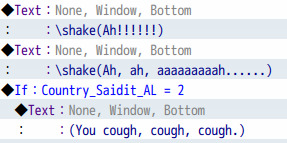
You can see both thinking things in threes and acting in threes here. It's everywhere. If you look through the game again, you won't be able to help but notice how often they do things in threes.
Speaking of the coughing though, that's another one of the compulsions they do. Covering their mouth, coughing, gagging, they do all of those when trying to banish disturbing memories or thoughts from their mind.
After looping when refusing to try to say the name of their country when the King asks.

Notice again, they repeat "You know" three times. Like I said, you'll start seeing that EVERYWHERE now.
To note, if you try to say it once and try not to say it another time, you'll get this instead:

Three breaths, here.
I could go on, but I don't think I need to.
Another important factor when considering OCD is the need for control. People with OCD not only report a lower level of perceived control over their thoughts and actions, and not only tend to need a higher level of control than the average person to feel safe and comfortable, but also, the less control over their environment they have, the more that OCD symptoms often intensify. (5)
Siffrin is in a paradoxical position here, in regards to control. When they first realize they're in a timeloop, they're absolutely ESTATIC. The first bathroom break monologue exemplifies exactly WHY he's so euphoric at this point:

He's euphoric with CONTROL. No matter what happens, he can always try again. He's safe. He can keep everyone he loves safe. He has SO MUCH CONTROL.
When the illusion shatters, after he's dragged back when they beat the king, that's when he realizes how little control he actually has. Sure, he can decide when he loops (most of the time) but he can't decide to STOP looping. He's trapped. The more he tries to escape, the less control he seems to have (Eg, what happens to Bonnie). After that, we can see him start to have intrusive thoughts, engage in more ritualistic behavior, and end up in more unhealthy anxiety spirals.
...And, we see him lean into the little control he DOES have (looping) more. Any time he's in a stressful situation? Any time that the control he has over a situation starts slipping away? Is Bonnie yelling at him with tears in their eyes and telling him to die? Is Isabeau pulling away from their shaking grip on his collar? Is Odile confronting him on his suspicious behavior? Are things OUT OF CONTROL? ...Control is taken back. Forcefully. He can't handle loosing more control, not when he already feels so helpless and trapped.
Talking about the bathroom scenes, there's another one I want to point out. The first Friendquest run. It's the perfect example of delusional anxieties and compulsions used to quiet the distressing thought, rather than soothe them.

...Yeah.
Siffrin is suddenly overcome with the anxiety that the simple act of believing that his plan could work will somehow make it not come true anymore. This is an example of "magical thinking", or a belief that defies the scientific or culturally accepted laws of causality (eg. "If I step on a crack, my mother's back will break"). It's specifically an example of TAF, or "Thought-action fusion", which is the belief that one's mere thoughts can cause completely unrelated actions to happen in the real world. This is an essential part of how compulsions can genuinely relieve anxiety, and is actually one of the differences between those with other anxiety disorders and those with OCD. Magical thinking is essential to OCD. (6)
This exchange also showcases an example of how compulsions done to quiet rather than to soothe can sometimes involve self harming behaviors to "shake" the thought out of one's mind. In this case, him hitting his own head and focusing on the pain rather than on the thought. Most definitely not a healthy way to deal with it! But what else do we expect from Siffrin, honestly.
Another example of a self-harming compulsion being used to "shake" out a distressing and unwanted thought, also including a more minor example of magical thinking:

Researchers and psychologists have often attempted to divide OCD into subtypes. This has usually been done because different types of obsessions often demand different treatment plans. (7) The actual divisions have varied from researcher to researcher, but one type that consistently comes up, is harm OCD/moral OCD. (Of note, one person usually, but not always, fits into multiple subtypes. I personally think Siffrin fits into multiple) Harm OCD is characterized by a fixation on believing one is a bad person and causing harm to others, often despite others expressing the contrary. This often comes along with very intense self-criticism and judgement.
After repeating a Friendquest route multiple times:

Mal Du Pays fight:

Siffrin specifically is fixated on the worry that the knowledge that they gained by looping gives them an unfair power dynamic with their party, and taking any action informed by that knowledge means that they're taking advantage of them or forcing them to do what he wants. This is despite the fact that, no matter what he chooses to do, they are still autonomous beings who do what they want. He has less control than he thinks.
Also from the Mal Du Pays fight:


("You should've died for me. You should've died to protect me. You should've died to protect me.", "You can wish and wish and wish all you want.", "They'll forget you. They'll forget you. They'll forget you.")
And what of Loop? They're also a Siffrin, right? Examination of the self from an outside perspective has given them time to introspect a bit more. They directly name and point out one of Siffrin's rituals. @dormont pointed this out, in one of his posts. (8)
Loop says, here:

They understand why Siffrin is doing this. Siffrin is afraid that he'll forget again. There was no warning, before the Island vanished from everyone's mind. The coin is a physical reminder that he forgot his first family, that he can't forget this one too. He often rolls it in his pocket, but sometimes grips it tightly, or flips it. In his mind, touching it will prevent him from forgetting again.
Now this is fascinating when thinking about One Hat, because in that eventuality Siffrin, after failing to find Loop at the Favor Tree, leaves his coin where Loop used to sit. This shows that he's doing better mentally, in Act 6. That he trusts himself more to remember, that he doesn't need the coin anymore.
Throughout the game, Loop keeps the comedy mask glued tight to their starry face. Because of that (and the fact that we don't see inside of their head), we don't get to see much of their own obsessions or compulsions. But there is one time where their mask slips. During Two Hats.
When they start becoming more and more distressed, they fall back into repetitions of three:


And if they win the fight....

And after the fight...

But of course, it's not all in distress. What was I saying, at the start of the post? The other reason why Siffrin repeats things in threes? When he wants something to go right, right? When he has a desired outcome, when he's sharpening his knife, when he's carving a figure. "Please be sharp, please be sharp, please be sharp."? At the end of it all, as Loop is fading away:

"I'll see you again soon, I promise! I super promise! I super duper promise!"
And Siffrin understands exactly the intention and desire that they pressed into that repetition. After Loop is completely gone, they mirror their actions.

("You flip it once, twice, three times.")
("You will see each other again.")
Additional resources:
1: Taylor, E. (2020). Discordant knowing: A puzzle about insight in Obsessive–Compulsive Disorder. Mind & Language, 37(1), 73–93. https://doi.org/10.1111/mila.12301
(About the concept of insight in irrational cycles in OCD! Very interesting)
2: ICD 10: The complete official code set. Internet Archive. (2017).
(ICD 10, Account is needed to read the full thing)
3: American Psychiatric Association. (2013). Diagnostic and statistical manual of mental disorders (5th ed.)
(DSM 5, for reference)
4: Starcevic, V., Berle, D., Brakoulias, V., Sammut, P., Moses, K., Milicevic, D., & Hannan, A. (2011). Functions of compulsions in Obsessive–Compulsive Disorder. Australian & New Zealand Journal of Psychiatry, 45(6), 449–457. https://doi.org/10.3109/00048674.2011.567243
(Article about reasonings behind compulsions. Honestly I think a lot of the "other reasons" categorized here for compulsions are just...different manifestations of reducing anxiety. But it's still helpful to show how sometimes compulsions are done subconsciously)
5. Moulding, R., & Kyrios, M. (2007). Desire for control, sense of control and obsessive-compulsive symptoms. Cognitive Therapy and Research, 31(6), 759–772. https://doi.org/10.1007/s10608-006-9086-x
(Article around OCD and the need for control)
6. Kingdon, B. L., Egan, S. J., & Rees, C. S. (2011). The illusory beliefs inventory: A new measure of magical thinking and its relationship with obsessive compulsive disorder. Behavioural and Cognitive Psychotherapy, 40(1), 39–53. https://doi.org/10.1017/s1352465811000245
(Article about magical thinking/TAF/history of the other studies done on the importance of them in OCD & creating a better framework to assess them)
(7) McKay, D., Abramowitz, J. S., Calamari, J. E., Kyrios, M., Radomsky, A., Sookman, D., Taylor, S., & Wilhelm, S. (2004). A critical evaluation of Obsessive–Compulsive Disorder subtypes: Symptoms versus mechanisms. Clinical Psychology Review, 24(3), 283–313. https://doi.org/10.1016/j.cpr.2004.04.003
(Critical overview of the concept of OCD subtypes and what their purpose is)
(8)
(Eve's post :]. Check the replies for more elaboration!)
#isat#in stars and time#isat siffrin#isat loop#siffrin#isat spoilers#MAJOR spoilers !#soliloquy#long post
655 notes
·
View notes
Text
ORORUN REDRAW GUIDE !
i think we’ve all seen the atrocity that is genshin’s unreleased character, ororun. the entirety of natlan is a mess really, but as a yoruba person myself i CANNOT keep quiet about ororun specifically.
outside yoruba mythology, in yoruba, ‘Olorun’ (the name ororun is based on, pronounced o-law-roon , with o pronounced as in orange and the ‘roon’ pronounced shortly, not dragged on at all) is actually the same word we often use to refer to God in Christianity. Christianity is the primary religion among us yorubas so honestly, i was kinda glad they misspelled his name. it would feel SO disrespectful referring to whatever that thing is with the same word we use to refer to God who we actually worship. religion aside, genshin’s depiction of Olorun (cultural god, not Christian one) is downright disgusting. i’d never paid too much attention to genshin and its poor representation, but now that my culture has fallen victim to it, i completely understand all the outrage.
edit: please note that while we use ‘Olorun’ to refer to the Christian God, Olorun is just a general word for ‘god’ itself ! for example if i say “God in heaven” and “god of thunder” we know i’m referring to two different beings, in yoruba it’s the kind of the same—the same word is used to refer to both the Christian and other gods, but we know it’s different, even though olorun can be capitalized regardless of what god we’re talking about (unlike english where the Christian God is capitalized and other gods aren’t) at the end of the day though, when we say “olorun” even without context, we are usually referring to the christian God !
1. PLEASE DO NOT DRAW HIM WITH ANIMAL EARS !
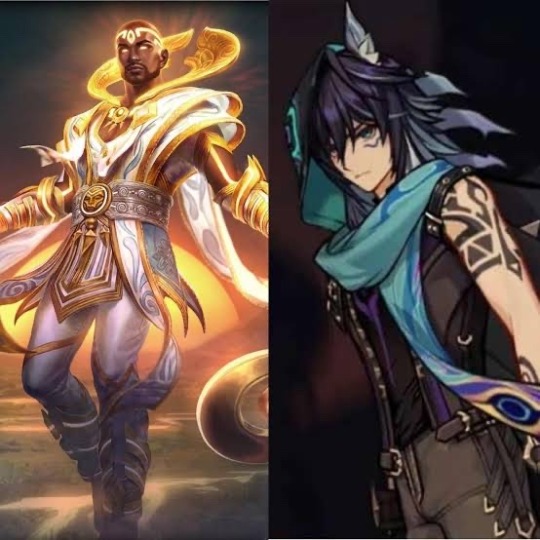
i’ve noticed that hoyoverse has this nasty habit of portraying every dark skinned character as wild or animal-esque. kaeya seems to be the only exception to this. even xinyan, though lacking any animal features, has this wild energy to her. some might call it a stretch, but i feel like her features are pretty feline in comparison to other liyue characters.
Olorun in our culture is the supreme god of the heavens. In my opinion, it is disrespectful to liken him to something akin to an animal. normally i wouldn’t even mind that much, but with how hoyo makes its few dark characters more and more like animals, i can’t help but feel weird about it. its really off putting.
2. HIS HAIR WOULD NOT BE CURLY !
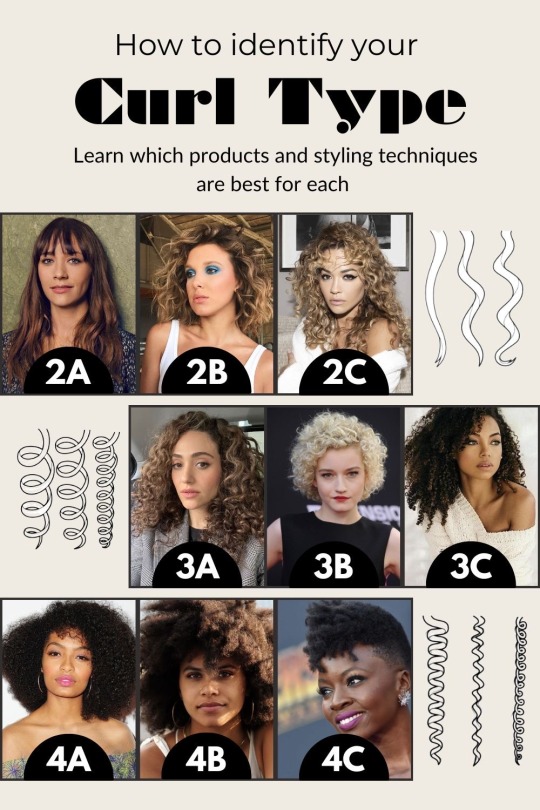
majority of nigerians have 4C HAIR. not wavy hair or loose curls. some have 4B, but 4C is the usual here, that is, kinky or coily hair. Olorun is often portrayed as bald in traditional art, but trust me if he had hair his hair would resemble his people’s, not Tyla’s.
DREADLOCKS ARE A YES ! outside nigeria, locking hair is pretty common, but in nigeria a lot of people have locks naturally. our hair sometimes just grows out that way, no treatment no nothing. dreads are 100% an appropriate style, they look good asf too.
3. PLEASE USE CULTURAL FABRICS IN YOUR DESIGNS !
when i saw ororun’s outfit, i almost started crying. they couldn’t even bother to dress him up a little. they really dressed my brother in a scarf and cape and called it a day 😭 upon how fashionable we nigerians are know to be, hoyoverse still made it their mission to embarrass us stylistically. God knows my people have suffered man 😭
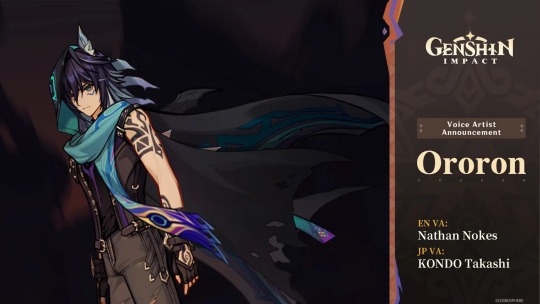
ankara is a traditional nigerian fabric that features bright colors and lots of patterned designs. see below:
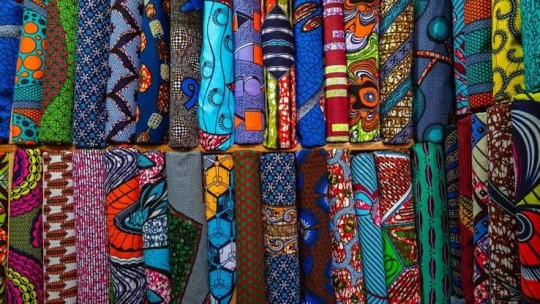
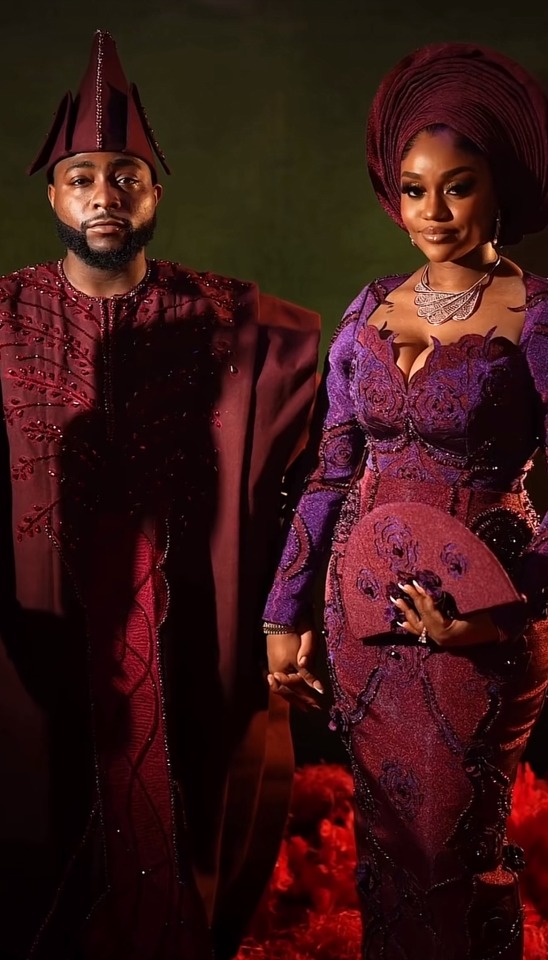
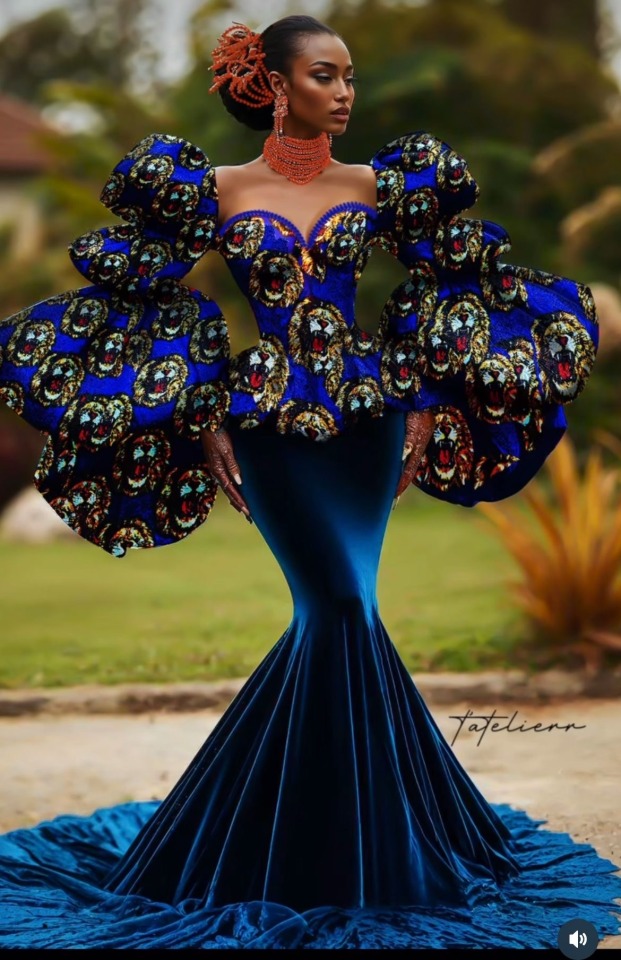
here in 9ja, we love our ankara. it’s a big part of our fashion here and trust me it would look excellent in your designs. it’s perfectly fine to draw ororun in normal fabrics since he’s a deity and it’s not like ankara existed back then, but if you really want to represent nigeria, ankara is a must 🙏
i’m going to address another fashion piece because if you search up nigerian fashion you’ll see it a lot: beads.
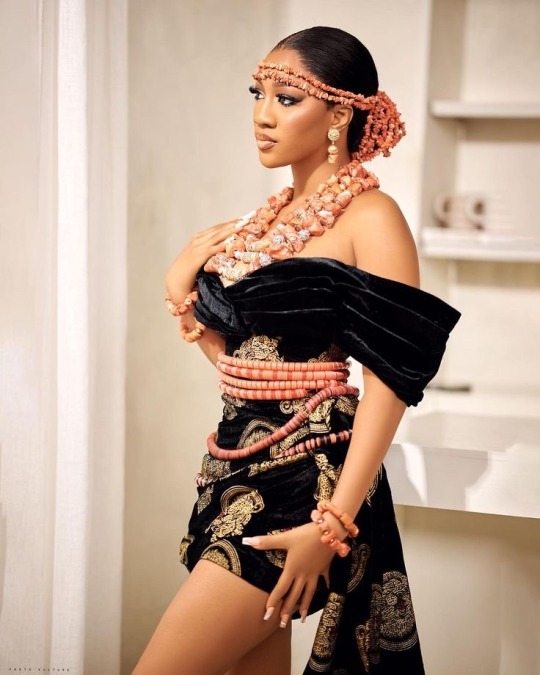
these orange beads are igbo (another tribe here in nigeria) NOT yoruba. does this mean you can’t use it in olorun’s design ? no ! let me explain. tbh, here in nigeria there’s a bit of...tension between clans. it’s not that common, but older people are definitely a lot more tribalist. as a yoruba i love my igbo brothers and sisters, i truly believe they’re the most fashionable clan and i adore their festivities, they always go over the top. please, just look at them:
(only one image because of image caps, ugh)
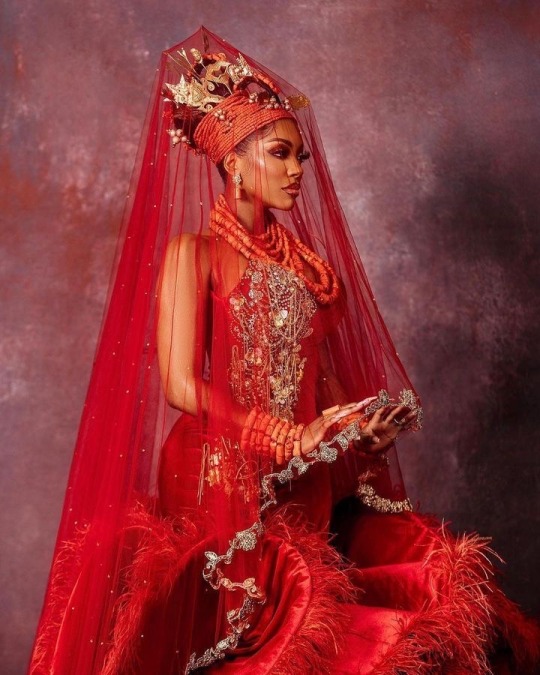
anyway, we yorubas wear beads too. but the specific way the beads are worn around the head and in multiple layers round the neck is igbo, not yoruba. though i personally wouldn’t care too much if i saw olorun with igbo beads since all i want is for him to at least look nigerian, at the end of the day he is a yoruba deity. it might be disrespectful to dress the god of one clan as if he belongs to another, especially since there is so much historical ( and very slight but uncommon present ) day tension between both clans.
here’s a more yoruba outfit. sorry yall, it might be hard for you to distinguish if you’re not yoruba or igbo, but a lot of nigerians can tell the difference at a glance. ( actually nowadays, there is so much overlap between yoruba and igbo fashion, but there are many specific styles that may be associated with one tribe and not the other, for example how beads are worn in the above paragraph ) please do your research, he’s not only a nigerian god, but a yoruba one.
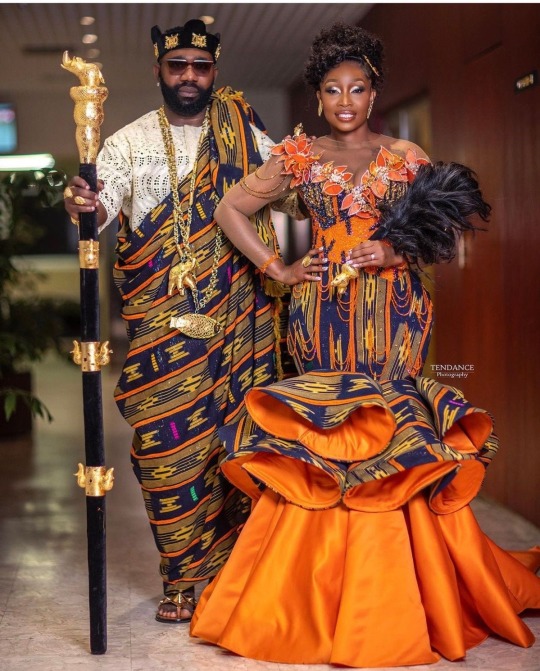
one more thing, because i know it will start discourse : skin tone.
nigerians have a very diverse range of skin tones. some of us are so pale, if not for our afrocentric features we could maybe pass for another race. however, ororun is yoruba.
light skinned nigerians are usually igbo. not to say that yorubas can’t be light skin, but here in nigeria if you saw a light skinned person, we’d automatically assume they were igbo. igbo people usually have lighter skin tones. majority of yorubas fall on the more milk to dark chocolate end of the skin tone spectrum. i’m saying this now because i know a lot of people are going to start arguments over ororun being redrawn as ‘too light’ or ‘too dark.’ i don’t really care about complexion, but i thought i’d help you all get your facts right.
that’s it ! if you read all this i’m super thankful. i don’t usually post about this kind of stuff but i honestly love my country and could go on about it for days. nigeria is such a beautiful place with a diverse range of cultures— from hausas to fulanis to so many more. natlan was supposed to be Africa’s time to shine, as well as latin americans, but hoyoverse said fuck you and your people. they did this to an extent with sumeru but natlan was done straight up dirty—not a single melanated character in sight, and the only one who does have melanin, iansan, looks so desaturated you might as well call her grey. i saw someone on tiktok call mualani a dark skinned character—it was at that point that i knew genshin was done for.
please REBLOG this post so it reaches more people and artists in the fandom !! this is literally the third time i’m making this post because tumblr refuses to show it in the tags for some reason 😭 i encourage other cultures who feel misrepresented to make posts like this too. it’s a perfect opportunity to educate and inform people about the diverse cultures genshin has once again failed to represent properly.
Hoyo has never been one to make customer satisfaction their top priority, but we’ve been able to call them out before and i truly believe we can do it again. Natlan is not poor design choice. it is blatant racism, a nation based on POC ethnicities with not a single colored character insight. Hoyoverse has been able to escape racism accusations for as long as i can remember, but natlan is the icing on the cake. we CANNOT allow hoyo to proceed as planned without giving them the appropriate backlash.
Also, if you redraw ororun using this guide, make sure to tag me here or on my main blog, @heartkaji !! i’d love to see all your redesigns. once again, thank you all for reading and have an amazing day !!
#REBLOG REBLOG REBLOG !#genshin#genshin impact#sumeru genshin#genshin sumeru#genshin natlan#natlan genshin#genshin oc#genshin fanfic#genshin fanart#genshin spoilers#genshin leaks#mihoyo#hoyoverse#genshin ororon#genshin kinich#kinich#mualani#mualani genshin#honkai star rail#honkai fanart#honkai sr#honkai impact 3rd#honkaiedit#hsr#hsr fanart#genshin redesign#sumeru#natlan#( 🛁— !! )
1K notes
·
View notes
Text
I’m going to disagree with a little thing. I don’t think it’s easy to be pro-Palestine and against antisemitism, because we are all enmeshed in cultures that have Islamophobia, anti Arab racism, imperialism, AND antisemitism at their core. It’s a constant learning process and because anti-arab racism and antisemitism are embedded into these cultural contexts infinitely older than the modern state of Israel, we cannot automatically assume that any stances we hold on these issues are automatically “moral” or “pure.” I think I’m on a journey of unlearning that will go on for a long, long time. It doesn’t “cost zero dollars not to be antisemitic” because antisemitism is an extremely delicious, useful conspiracy to explain just how the world works and is central to the operational logics of conspiratorial thinking about how the world works. It will cost you a lot of dollars, just like it will cost you a lot of dollars to stand up for any other oppressed group. I don’t assume myself to be morally pure either- I have so many of my own biases, including racism, Islamophobia, and a continued fight with internalized antisemitism, and we Won’t get anywhere until we can face these issues head on and interrogate the nuances. I’m so burned out on people claiming fighting any of this is easy. It’s not. Do it anyway.
2K notes
·
View notes
Text
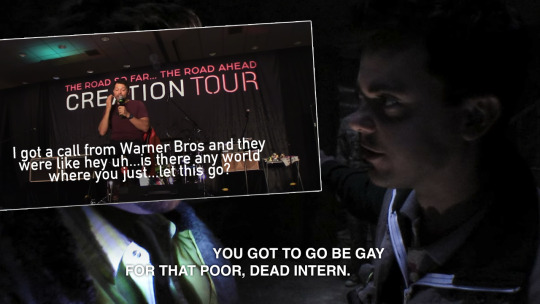
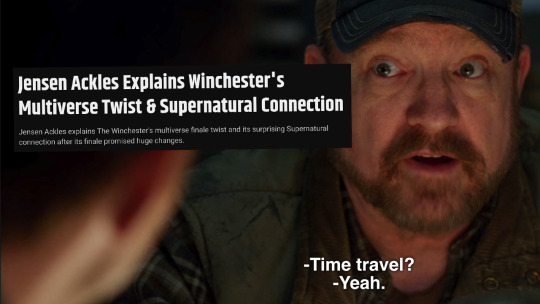
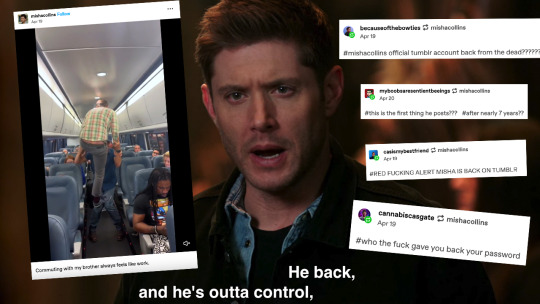
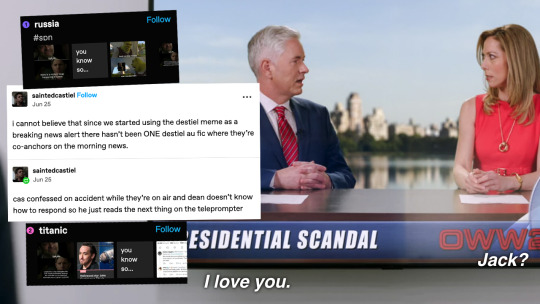
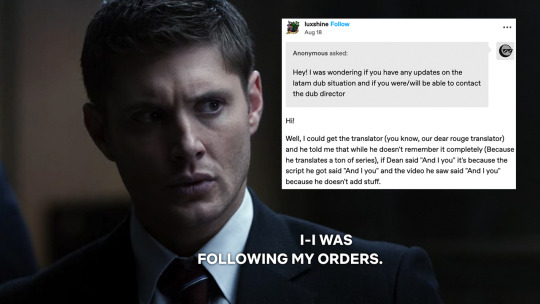
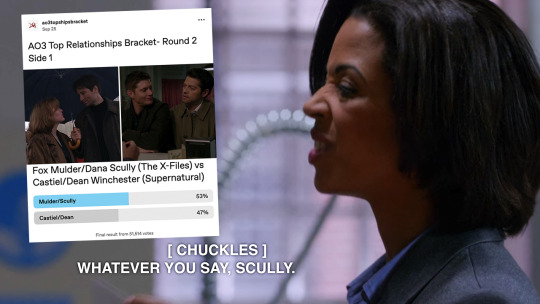
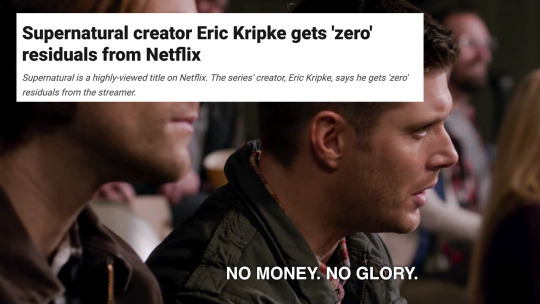
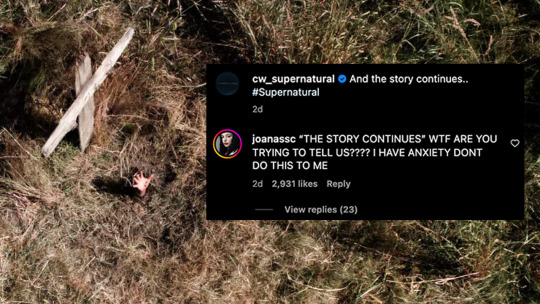
THREE YEARS SINCE NOV 5TH, 2020 as summed up by Supernatural (sequel to this and this)
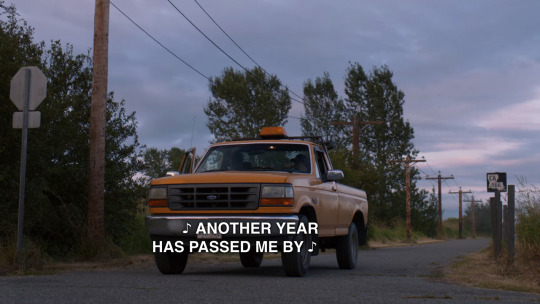
image ID & context below:
[image ID: screenshots of Supernatural paired with screenshots of various tweets, news headlines and Tumblr posts.
A screenshot of Ed and Harry in SPN 3x13 Ghostfacers saying "You gotta be gay for that poor dead intern" with a screenshot of Misha Collins at the SPNNJ 2023 convention saying "I got a call from Warner Bros and they were like hey uh...is there any world you just let it go?" This is in reference to an incident in 2022 where Misha accidentally made headlines after a comment that seemed to be referring to his sexuality. His comments at this year's panel imply that the studio in fact did not want him to retract the comment and make the apology that he posted, but to instead just roll with it.
A screenshot of Bobby saying "Time travel?" and Dean saying "Yeah" in SPN 6x18 with a headline that says "Jensen Ackles' Explains The Winchester's Multiverse Twist & Supernatural Connection." This is about the series finale of Jensen's Supernatural spinoff "The Winchesters", in which it is revealed Dean and the Impala somehow traveled the multiverse to the alternate timeline the show takes place in.
A screenshot of Dean in SPN 15x08 saying "He's back, and he's out of control" with a screenshot of Misha Collin's first Tumblr post in seven years, a video with him and his brother being a public nuisance on public transportation. Also included are screenshots of various Tumblr users reacting with tags from various tumblr users. becauseofthebowties: "mishacollinsofficial tumblr account back from the dead???" myboobsarentsentientbeings: "this is the first thing he posts? after nearly 7 years???" casismybestfriend: "RED FUCKING ALERT MISHA IS BACK ON TUMBLR" cannabiscasgate: "who the fuck gave you back your password"
A screenshot of two news anchors in SPN 14x20, with one (named Jack) telling his co-host "I love you" and her replying "Jack?" with screenshots of the Destiel/Supernatural Confession meme trending multiple times this year with other current events topics like Russia, Titanic, etc. There is also a screenshot of a post by saintedcastiel that says "I cannot believe that since we started using the destiel meme as a breaking news alert that there hasn't been ONE destiel news anchor AU fic where they're co-anchors on the morning news. cas confessed on accident while they're on air and dean doesn't know how to respond so he just reads the next thing on the teleprompter."
A screenshot of Dean in SPN 5x14 as Cupid says "I-I was just following orders" with a screenshot of an anonymous Tumblr ask to user luxshine. The ask says "Hey! I was wondering if you have any updates on the LATAM dub situation and if you were/will able to contact the dub director". luxshine says "Hi! Well I could get the translator (you know, our dear rogue translator) and he told me that while he doesn't remember it completely (because he translates a lot of series) if Dean said "And I you" it's because the script he got said "And" I you" and the video he saw said "And I you" because he doesn't add stuff." This is in reference to a change in Spanish LATAM dub of Castiel's confession SPN 15x18, which added a line where Dean reciprocates, which was previously suspected to be a change added by the LATAM dubbing director or translator
A screenshot of a detective from SPN 8x08 saying, "[Chuckles] Whatever you say Scully" with a screenshot of the tumble blr blog ao3topshipsbracket's poll "AO3 Top Relationships Bracket - Round 2 Side 1" with Fox Mulder/Dana Scully (The X-Files) vs. Castiel/Dean Winchester (Supernatural.) In the final results from 51,514 votes, Mulder/Scully won by 53% and Castiel/Dean won by 47%. In early 2023, Tumblr added a polls feature which has led to numerous content, debates, and bracket polls similar to this.
A screenshot from SPN 11x15 where Dean says "No money, no glory" with a headline that says "Supernatural creator Eric Kripke gets 'zero' residuals from Netflix"
A screenshot of Dean rising from his grave in SPN 4x01 with a screenshot of a post from the official CW Supernatural Instagram with a clip from the pilot episode and the caption "And the story continues..." and a comment from a user that says "THE STORY CONTINUES?? WTF ARE YOU TRYING TO TELL US?? I HAVE ANXIETY YOU CAN'T DO THIS TO ME." For context, no one is sure if the post was supposed to reference new content from Supernatural or not but it has led to speculation.
A screenshot of SPN 8x01, with the onscreen lyric "Another year has passed me by."
#almost thought there wouldn't be enough for a year three post but here we are once again#destiel#spn#supernatural#nov 5th#november 5th#destiel anniversary#destiel confession meme#destiel news#deancas#nov5thposting#ntjdmakesthings
2K notes
·
View notes
Text
Dragon Age: The Veilguard info compilation Post 4
[Part 1] [Part 2] [Part 3] [another post]
Post is under a cut due to length.
There is a lot of information coming out right now about DA:TV from many different sources. This post is just an effort to compile as much as I can in one place, in case that helps anyone. Sources for where the information came from have been included. Where I am linking to a social media user’s post, the person is either a dev, a Dragon Age community council member or other person who has had a sneak peek at and played the game. nb, this post is more of a ‘info that came out in snippets from articles and social media posts’ collection rather than a ‘regurgitating the information on the official website or writing out what happened in the trailer/gameplay reveal’ post. The post is broken down into headings on various topics. A few points are repeated under multiple headings where relevant. Where I am speculating without a source, I have clearly demarcated this. if you notice any mistakes in this post, please tell me.
Character Creation
BioWare confirmed that even if you make your Rook a short king, the team has done work to ensure animations fit any character build [source]
"Dragon Age's character creator has seen a massive glow-up" [source]. "The volume of choices you get here are frankly insane. As Epler noted, “you could spend forever here,” and he’s not kidding." [source] The art and graphics teams spent a lot of time trying to make hair look amazing [source: the Discord]
In CC we can customise our "bulge size" [source]
Some more detail on the new lighting options to see how Rook looks like in CC when you make them: you can view them in "blazing forest sunshine versus the glare of an underground temple" [source]
"newly mobile, extra-hairy hair" [source]
Faction choice has statistical boons. For example, Shadow Dragon Rook deals extra damage to Venatori blood cultists [source]
Faction choice basically determines why Rook has been called to help in the fight against Solas [source]
All pre-determined character models in CC can be adjusted [source]
You can make a really tall dwarf if you want [source]
"Setting your previous world state is fully integrated into the character creator for Veilguard" [source: the Discord]
Inquisitor appearance will be re-created, there is no way to carry their appearance from DA:I into the game [source: the Discord]
Classes for Rook are not restricted in the sense that you can play any almost class, lineage and faction combination that you want. For example, a mage Rook can be a Crow [source: the Discord] (Fel note: it sounded like Rook cannot be a magic-wielding dwarf, even though the exception of Harding now exists) (Fel note: there is a mage Crow in one of the books)
Story and lore
Here is another article which refers to Rook as "the Rook" [source]
The story is set "9-10 years from DA:I and about 8 years from Trespasser" [source: the Discord]
They have been tracking Solas for "a while. Something else you’re gonna learn about…" [source]
The game does not use the Keep [source]
Shadow Dragon is the faction background with the most in-game reactivity (e.g. from other characters' dialogue) during the prologue section of the game, due to the fact that the prologue is in Minrathous and the Shadow Dragons are a Tevinter-based faction [source]
"I also saw a big moment after the gameplay trailer ends that I can't talk about" [source]
During the more narrative-heavy dialogue choices, "the game will also give a bit of context on what you're about to choose, but doesn't go as far as explaining the exact consequences or precisely what will happen thereafter" [source] "the game shows you how you’ll go about the choice, but it doesn’t tell you the consequence of that choice". [source]
"The game is bringing back Dragon Age 2s dialogue system, which was tone-based and resulted in its protagonist Hawke falling into one of three different personality states. You have three general tones in a conversation: kind, humorous, or aggressive, with slight variations depending on the situation" [source]
"Venatori blood cultists" [source]
"The whole game has the makings of another Suicide Mission [ME2], given that you are up against a god with the ability to collapse dimensions" [source]
"Choices and consequences". "Now, it seems you can see the effects of your choices like never before, and this time, they marry that choice with incredible visuals" [source]
In the bar when you're trying to get information in the opening, if you choose to fight it out and the barbrawl ensues, you then have to run from the pursuers in the bar [source]
A key concern of the developers when creating the environments was to make “a world worth saving" [source]
The prologue is quite linear but there are additional paths you can follow to find additional loot [source]
In the opening section of the game there is a dock which has been attacked and the soldiers that were there have been killed, "but rather than seeing this passively, we walked through the aftermath and had to interact with the scene to piece it all together" [source]
The tone of the gameplay video is a good indicator of the tone of the rest of the game [source]. On the tone: "dark fantasy" [source]. horror & gore is back along with DA's classic dark elements [source]
Tevinter Nights is a better tone indicator for the game than the original reveal/character trailer. Ghil Dirthalen: "Tevinter Nights has felt the most 'DAV' to me" [source]. The gameplay reveal video is the best indicator for the tone of the game (vs the character one) [source]. there is still messy dark shit in the game [source]
Tonally the game is closest to Tevinter Nights and DA:O [source]
Ghil Dirthalen: "[as] one of those unfortunate souls who has latched onto a media world so hard: This game is for me. For the hardcore DA lore nerds, I've been secretly screaming about things I saw for MONTHS now" [source]
The game is true to the DA stories we know and love [source]
Characters, companions, romance
You can choose to engage in companions' own storylines as you progress or ignore them entirely [source]
You will often have to make dialogue choices that will affect how your various companions treat you [source]
Neve is quick-witted [source], measured and elegant [source]
In the opening, you interact with the companions as you move through Minrathous. "your choices during these interactions will determine who goes on portions of the mission with you, along with how “pleased” they are with the answers." [source]
On Varric and Harding: "Instantly the two felt like they’d never been away and avoided the trap of being parodies or fanfiction versions of themselves" [source]
Solas' eyes were always purple hh [source] (yes!)
Gameplay, presentation, performance etc
Some enemies have additional shields that are weak to ranged attacks [source]
When asked about if the war table from DA:I returned, John Epler said "There is a table. Now, whether it works the same way as the table in the previous game..." [source]
Once you get passed a certain point in the game, it opens up dramatically, however it is not an openworld game and they wanted to make sure that all the content mattered and was a more structured, sculpted experience for the player. There is some exploration, some opportunities to get off the beaten path, and some spaces that are fairly wide [source]
The button to press to bring up the skill wheel is RB or R1 (depending on what controller you're using) [source]
"You'll also have access to two skills or spells for each of your two companions that you can command. For a more seamless, uninterrupted combat experience, you can also assign these skills to shortcuts (such as holding the left trigger and hitting the X button) to quickly use them" [source]
"The game is bringing back Dragon Age 2s dialogue system, which was tone-based and resulted in its protagonist Hawke falling into one of three different personality states. You have three general tones in a conversation: kind, humorous, or aggressive, with slight variations depending on the situation" [source]
"booting Fade demons into pits" [source]
"BioWare have revised Dragon Age's art direction to make character models a little more consistent with the series' lovely Tarot-inspired menu art. Flesh is ruddy to the point of painterly; facial features and bodily proportions are thicker and more striking, as though the characters had been cut from clay" [source]
The 3 specs for Warrior are Reaper (has lifesteal/stealing health from enemies, and other freaky powers, does big damage), Slayer (can wield the biggest blade, big swords, big damage) or Champion, which is tanky, shield-using and Paladin like [source] [source]
There are quick-recover prompts [source]
You can roll through puddles of incoming AOE [source]
There are ziplines between some levels levels [source] (Fel note: just like in As We Fly... )
There are also slidey hills to slide down between some sections [source]
There are still some Hinterland-type areas designed for exploration [source]
We can do some home base management to our home base [source] (Fel note: this refers to The Lighthouse, detail in a previous post)
Camera placement is quite zoomed out [source]
Where Rogues have 'momentum', Warriors have 'rage' and Mages 'mana'. When a warrior spends rage in the ability wheel it triggers more powerful attacks. this has been referred to as a build-and-spend mechanic. this system resource gates your use of more powerful skills and is built by getting stuck in [source]. Momentum for Rogues is built by landing hits without taking any [source]
There are big glowing environmental cues for picking up loot or replenishing health potions [source]
"Epler noted that The Veilguard will not be an open-world experience like Inquisition, and instead will have large spaces to explore with quests littered throughout. This allayed my early concerns that they would course correct too hard from the oft-maligned open areas of Inquisition" [source]
Melee and ranged attacks can be charged up [source]
It sounds like there is an option to have greater guidance on when enemies are attacking [source]
The community council gave a lot of notes on the game's art direction to BioWare (gave feedback to the devs) that they were told and shown were changed from the first reveal/character trailer, these made it into the gameplay trailer [source]
The community council asked about having an arachnophobia mode, though they can't guarantee this was implemented [source]
"You’re encouraged to explore and grind for stronger weapons and gear, so your stats and cosmetics improve the further you get into the game" (in the sense that you’ll be rewarded for hard work) [source, two]
Follower information such as cooldowns and health will be visible on the HUD [source: the Discord]
There is a "quick cast" option if you prefer not to use the wheel, should be a chorded action using a controller [source: the Discord]
On PC you can play with keyboard and mouse or controller [source: the Discord]
An accessibility option is the ability to make auto-targeting stronger or weaker depending on your preference [source: the Discord]
The game will have DLSS support at launch [source: the Discord]
Re: hard drives, the game can be played using an HDD, they would recommend an SSD though for the optimal experience [source: the Discord]
There are lots of different interface options you can play with, e.g. combat text size, opacity, when to display health bars [source: the Discord]
Other
The leak from last year or whenever it was (the one that leaked screenshots and a gif from the game) was mainly a lot of outdated stuff and didn't really represent even the early version some community council members had played [source, two]. It was not leaked by a member of the community council, but by a member of another focus group [source]
The community council were given the chance to play the game twice, once in Fall 2022 and a year later in 2023 [source]
There is no information as yet regarding when pre-orders will be open [source: the Discord]
BioWare are hoping to at the very least have the very "best of" the Discord dev Q&A featured on social media and potentially in a blog [source: the Discord]
[☕ found this post or blog interesting or useful? my ko-fi is here if you feel inclined. thank you 🙏]
#dragon age: the veilguard#dragon age: dreadwolf#dragon age 4#the dread wolf rises#da4#dragon age#bioware#long post#longpost#video games#blood cw#mass effect#solas#dragon age: tevinter nights
551 notes
·
View notes
Text
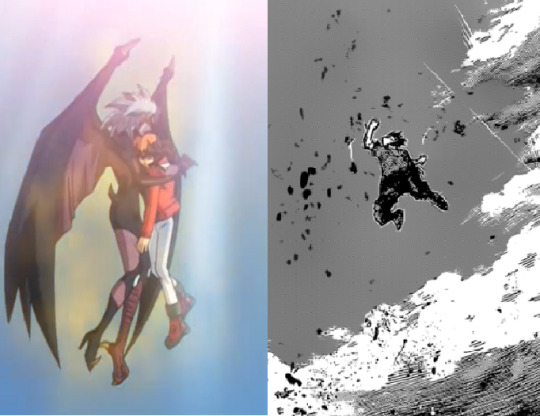
SHIGARAKI VS. YUBEL: HOW TO SAVE YOUR VILLAIN
The failure of Deku to save Shigaraki isn’t just a tragic conclusion for Shigaraki’s arc, it’s also My Hero Academia failing as a story. When I say the story failed, I mean the story has failed to answer any of the questions it asked its audience. It’s themes, character arcs, everything that communicates the meaning of the story to the audience is no longer clear.
Saving Shigaraki was the central goal of not only the story itself, but the main character Deku. By failing in its goal you can’t call this a good ending. In order to illustrate why this goal of saving the villain is so important to both Deku’s character and the central idea of MHA, I’m going to provide a positive example in Yu-Gi-Oh GX were the main character Judai successfully saves their villain. One of these stories fails, and the other succeeds. I will illustrate why under the cut.
BROKEN THEMES = BROKEN STORY
When artists draw they have to consider things like perspective, anatomy, shading, light, coloring. Drawing has rules, and it’s hard to produce good art without knowing these rules beforehand. If I draw something that has bad anatomy, you can criticize me for that.
Writing has rules, just like drawing. The rules of storytelling are important because writing is an act of communication. You can write whatever you want, just like how you can draw whatever you want, but if you break the rules the audience won’t understand what you are trying to communicate.
When I refer to MHA as a broken story, I am referring to the fact that it has broken the rules of storytelling. As this youtuber explains.
“I guess we should first define what broke and broken even means in this context. Has the story turned into an unintelligible mess? Not really. Value judgements aside, the narrative is still functional and fulfills the criteria of being a story. So how can a story that still functions be broken? Maybe to you it cannot. But to me a story that is still functional isn’t enough. What I mean when I say MHA is broken is that it’s lost something crucial. A codifying style of structure, pacing and payoff that until a certain point was the core of its identity.”
I could launch into a long-winded explanation of what themes are, but for the sake of simplicity I like to define themes in terms of “Ask, and answer.” The author asks a question to the audience, and then by the end of the story provides an answer. The audience is also invited to come up with their own answer which prompts them to think about the story on a deeper level. The question both MHA and GX are asking both its main characters and the audience is “Can you save the villain?” with the additional complicated question of “Should you save the villain?” This post will detail how both stories go about answering those two questions, and more importantly why those answers matter for the story.
With Great Power… You know the rest.
My Hero Academia and Yu-Gi-Oh Gx are actually similar stories once you get past their superficial differences. MHA is a story with way better worldbuilding, compared to a society where everything revolves around the trading card game, and people go to school to be better at a trading card game.
However, if you get past that. They are both bildungsroman, stories about the main characters growing up into adults. They both have an academy setting where the goal is for the main character to graduate and enter the adult world. They are both shonen manga. GX is the sequel of Yu-Gi-Oh a manga that ran in Shonen Jump the exact same magazine as MHA. The biggest point of comparison is their main characters, who both start out as young and naive who are driven by their admiration of heroes. Deku is a fan of All Might who wants to become a hero despite not having a quirk, because he loves All might who saves everyone with a smile. Judai’s entire deck archetype revolves around “Elemental Heroes’ and later “Neo-Spacians” who are all based on popular sentai heroes like ultraman.
The central arc for both characters is to grow up. Growing up for both of them not only requires figuring out what kind of adult they want to be, but also what kind of hero they want to be.
Now I’m going to drastically oversimplify what a character arc is.
A character arc first starts out with the character being wrong. Being wrong is essential because if the character is right from the beginning, then there’s no point in telling the story. A character often holds the wrong idea about the world, or has some sort of flaw that hinders their growth. The narrative then needs to challenge them on that flaw. It usually sets up some kind of goal or win condition. That flaw gets in the way of a character “winning” or achieving their goal, so they need to fix that flaw first. If their ideals are wrong, then they need to think about what the right ideals are. If they’re too childish, they need to grow up. If they have unhealthy behaviors or coping mechanisms, they need to unlearn it and require better ones. Otherwise, that flaw will keep sabotaging them until the end.
I’m borrowing the word “win condition” from class1akids here because it’s an incredibly appropriate terminology. Midoriya needs to do “x” in order to win, otherwise this victory doesn’t feel earned. The “x” in this case is usually character development. As I said before, a story where the main character hasn’t changed from beginning to end feels pointless. Especially in Deku’s case, he was already a brave, strong hero who would charge right into battle and defeat the bad guys in chapter one, so him defeating Shigaraki in a fist fight doesn’t represent a change.
The story sets up not only “What does the hero need to do to win?” but also “How does the hero need to change in order to win?” A character either meets these requirements before the end of the story, or they don’t and usually this results in a negative ending.
MHA in its first half quite clearly set up both the final conflict of saving the villains, and also that saving the villains is its “win conditions.” The hero shouldn't be allowed to win without first fixing this flaw.
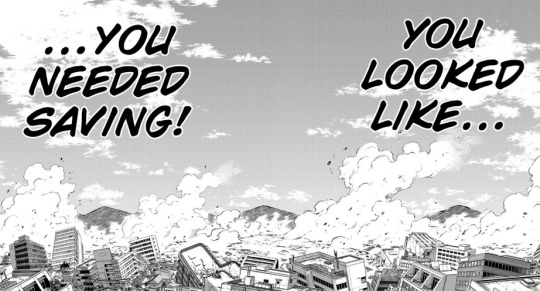
From this panel onward the central question Deku is forced to answer shifts from “Am I strong enough to defeat ShigarakI” to “Can I save Shigaraki?” However, much earlier than that All Might goes on to basically set up the win conditions of what makes the ultimate hero as someone who “Saves by winning, and wins by saving.”
All might: You can become the ultimate heroes. Ones who save by winning, and win by saving.
Therefore the story has set it’s criteria for what kind of hero Deku needs to become. If he wins without saving, then he’s failed to become what the series has set up as the Ultimate Hero.
Shigaraki and Yubel aren’t just narrative obstacles, or boss monsters to be killed like in a video game. They are narrative challenges, which means that the character can’t grow in any way if they don’t answer the challenge presented by the characters. They are villains who actively resist being saved, to provide a challenge for two heroes who define their heroism by saving others. The challenge they pose adds a third question to the story and the main characters.
"Can I save the villain?"
"Should I save the villain?"
"If I don't save the villain, then can I really call myself a hero?"
In other words the decision they make in saving, or not saving their final antagonist defines what kind of hero they are. In Deku’s case it’s even more critical he defines what hero he wants to be because the MHA is also a generational story, and several of the kids are asked to prove how exactly this generation of heroes is going to surpass the last one. The kids growing physically stronger than the last generation isn’t a satisfactory answer, Deku getting strong enough to punch Shigaraki hard is not a satisfactory answer, because we are reading a story and not watching a boxing match.
I’m going to focus on the last two questions though for a moment. Many people who argue against saving villains like Shigaraki argue he is a mass murderer and therefore isn’t worthy of salvation. However, the act of saving Shigaraki isn’t a reflection of Shigaraki himself, but rather the kind of hero Deku wants to be. It all boils down to Spiderman. In the opening issue of Spiderman, teenage Peter Parker is bitten by a radioactive spider and suddenly gains super strength, the ability to stick to walls along with other powers. However, being a teenager he uses these powers selfishly at first. He doesn’t feel the obligation to use his powers for other people, and therefore when he sees a robbery happening right in front of him he lets the robber go. However, because he lets the robber go, the robber then attempts to hijack a car and kills his Uncle Ben in the process. If Spiderman had stopped the robber then he might have prevented that from happening. He had the power to stop the robber, but he didn’t feel responsible or obligated to save other people. As a result Uncle Ben dies. It’s not enough to have power, ti’s how you use that power that reflects who you are, therefore: “with great power comes great responsibility.”
The choice to save Shigaraki actually has little to do with whether or not Shigaraki is redeemable, but rather how Deku chooses to use his power, and what he thinks he is responsible for reflects who Deku is as a person. Deku himself also clearly outlines how he wants to use his power, that One for All is a power for saving, and not killing.
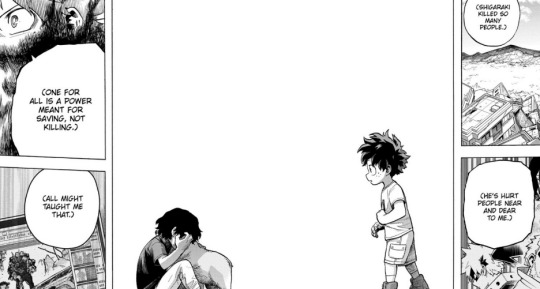
How he uses his power reflects Deku’s ideal in saving others, and therefore if he doesnt use his power to save, then he’s failed to live up to his ideals. It's not whether it's morally right to save a murderer like Shigaraki, but rather the way Deku wants to choose to use his power. It's about whether he feels the responsibility to save others.
Judai explores an incredibly similar arc to Deku. They are basically both asked what kind of responsibilities a hero is supposed to have, which is also a metaphor for growing up to handle the responsibilities of adulthood. As both characters start out with incredibly naive and childish ideas about what a hero is. Therefore realizing what a hero is responsible for is key to them growing as a character. However, Judai is different from Deku. In some ways he’s more like Bakugo. Judai is a prodigy who’s naturally good at dueling. He doesn’t duel to save others, but rather because duels are fun and he’s good at it. He’s very much like Bakugo, who admired All Might as a hero just as much as Deku did, but admired the fact that he was strong and always won rather than he saved others.
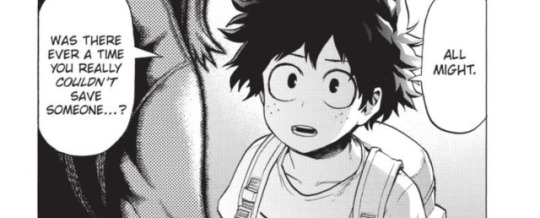
However, I would say both Deku and Judai are questioning what a hero is responsible for. They are both asking if they have the responsibility to use their power to save others. If they have to fight for other people, just because they have power. His first big challenge as a character comes from Edo Phoenix, who calls out Judai for not thinking through what it means to be a hero, and what responsibilities heroes carry. Judai duels because he thinks it’s fun. He will show up to duel to help his friends, but that’s because he’s the most powerful person in the group. Even then it’s because he finds fighting strong opponents to be enjoyable. Bakugo will beat up a villain, but for him it’s more about winning then if the action will save someone or not.
Judai is more often than not pushed into the role of being a hero, he doesn’t play the hero because he’s a particularly selfless person, and he’ll often avoid responsibility if not forced. He has power but no sense of responsibility and the narrative calls them out as a problem.
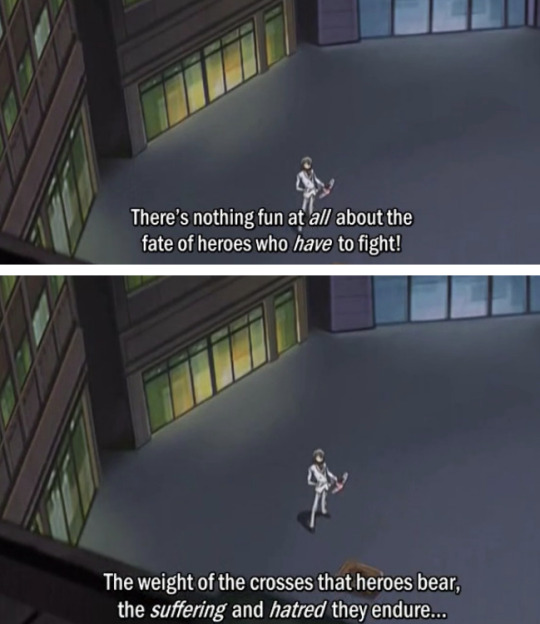
Edo: Can you even fathom that, Judai?
For Judai, he can’t understand the responsibility of being a hero. For Deku, he idealizes heroes so much he can’t understand that there are people out there the heroes have failed to save. These two callouts towards Deku and Judai are discussing similar because they’re both discussing where a hero’s responsibilities lie. Is a hero responsible for saving everyone? Is someone strong like Judai responsible for using their strength to help other people?
Judai’s arc continues into the third season where he’s not shown to just be naive but ignorant. He’s not just childish, he actively resists growing up because he doesn’t want to take on adult responsibilities.
THe same way that Deku just decides not to think about whether or not All Might failed to save people in the panels above. However, in Judai's case he's actively called out for his choice to remain ignorant.
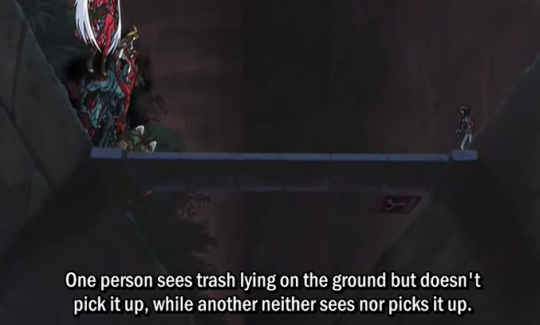
Satou: Now, which one is at fault? Judai: Isn’t it the guy who saw it, but didn’t pick it up. Satou: Not quite. If one is aware of the trash that fell, it may be picked up someday. But there is no possibility fo the unaware one ever picking it up. Judai-kun you are the foolish one unaware of the trash that has fallen. Judai: Are you calling me out for how I am? Satou: Your behavior towards me was atrocious. The worst was attending class only for credit, even if you were there you only slept. Judai: Yeah, I know. I was all bad, but it wasn’t that big a- Satou: It is important. You see, one by one, the students inspired by your attitude were losing their motivation. Now if you were a mediocre duelist, then this would not be an issue. Satou: However, you are the same hero who defeated the three mythic demons. Every single student in the academy admires you. You should have been a model for this academy. Judai: Me, a role model? Are you kidding? I just do whatever I feel like doing. Satou: Great power comes with great responsibility. Yet, as you remain unaware of that, you’ve spread your lethargy and self-indulgence.
seems like a minor issue, but look how Judai responds to the accusations. “I just do whatever I feel like doing.” Satou is arguing that Judai should pay attention to the influence he has on others because of his power, because how he chooses to use that power affects others. However, Judai chooses to actively not look at the consequences of his actions because he doesn’t want to take on that level of responsibility, and therefore he’s looking away from the trash.
While it seems like it doesn’t matter in Satou’s specific example, not thinking of the consequences, or how you use your power can have unexpected consequences. Spiderman doesn’t feel like it’s his responsibility to stop a bank robber, and that bank robber shoots his uncle. You could still argue it’s not Spiderman’s responsibility to stop every crime in the world, and I guess no one owes anyone anything from that point of view - but Spiderman failing to act responsibility had the consequence of directly hurting someone else.
Spiderman has to live with that consequence because it was his own Uncle that was hurt. This is where we really reach the duality of Judai.
In GX, Judai is, symbolically speaking, The Fool of the Tarot Deck, the Novice Alchemist — a person brimming with infinite potential, yet one who is also supremely ignorant, who walks forward with his eyes closed and often unknowingly causes harm in his great ignorance. In this, he is very much the embodiment of the faults we most commonly associate with teenagers — selfishness, recklessness, shallowness, a lack of dedication or empathy when it’s most needed. Like most people, he has good traits that work to balance out some of the above, but his narrative path through GX ends up being that of the flawed hero undone by his faults — and then that of the atoner, the repentant sinner. In his case, the mistakes of his teenage years are the catalyst for his growth from a boy into a man burdened with duty and purpose. Judai is someone with infinite potential, with great power, but also ignorant on how he should use that power, and that makes him an incredibly flawed hero who needs to learn how that power should be used.
Deku similarly exists in a society where heroes deliberately turn a blind eye to the suffering of a certain type of victim. Shigaraki’s speech heavily resmebles Satou’s speech about garbage on the side of the road.
Shigarali: "For generations you pretended not to see those you coudln't protect and swept their pain under the rug. It's tainted everything you've built."
Deku shares Judai’s ignorance, because he’s not only a part of a system that doesn’t even see trash on the side of the road, but he also worships heroes so much that he’s incapable of criticizing them. If Deku saw the flaws of heroes, but at first didn’t have the courage to speak out, but eventually gained the courage that would be one thing. However, if he doesn’t see the flaws of heroes, then the problem will never be fixed.
There are also consequences for both Judai and Deku failing to use their powers responsibly. These consequences take the form of the villains who came about because of all of society’s ignorance to the suffering of victims (Shigaraki) and because of the main character’s ignorance to their suffering (Yubel). Shigaraki and Yubel are also explicitly victims that the heroes failed to save, turned into villains who are active threats to the heroes.
Should I save the villain?
The answer is yes, because the decision to save is reflective of the kind of hero each character wants to be. Each story clearly sets up that Deku and Judai aren’t punisher style heroes who shoot their villains, they are being set up as heroes who save. Deku needs to “save by winning.” As for Judai, a big deal is made of Judai’s admiration for another character Johan who represents a more idealistic kind of hero. Johan unlike Judai is someone who duels with a purpose, something Judai outright says he admires because he’s empty in comparison.
Judai: Johan what have you been dueling for? See, it’s about fun for me… Well, for the surprise and happiness too. I guess I do do it for the fun. Sorry, I guess I put you on the spot by asking out of nowhere. Johan: What’s this about Judai? Judai: It’s nothing. Johan: I suppose there is one goal I have. Johan: Even if someone doesn’t have the power to see spirits, they can still form a bond with a spirit. That’s why I do it for people like him. [...] Johan: I'll fight for everyone who believes in me, and I'll do it with my Duel Monsters. Judai: I'm jealous you've got feelings like those in you.
Becoming a hero who uses their power to help others isn’t just a goal the story sets for Judai, it’s a goal that Judai sets for himself because of his admiration for Johan. Johan represents the idealistic hero Judai wants to be, but is also held back from because of his personality flaws. Johan represents the kind of heroic ideal that Deku is aspiring to be.
Johan’s ultimate goal isn’t punishing the wicked, but to use his power to save others.
Johan: Judai, it was my dream to save everyone through my dueling!
The story sets up the idea that it’s not enough for Judai to simply be strong, he’s also challenged to become a savior who uses his power to help others like Johan. Deku needs to “save by winning” and Judai needs to “Save everyone through his dueling.” However, Johan also adds another condition to what saving means. His idea of saving isn’t to defeat a villain, but rather his dream is to help connect spirits and humans together, even if there are humans who can’t see spirits. Johan doesn’t save people with the power of physical force, but rather the power of human connection.
Should I save the villain?
Here the answer is "Yes", because wants to become more like Johan someone who uses their power to help others not just for themselves. Then we reach the third question
If I don't save the villain, can I really call myself a hero?
It once again comes to power and responsibility. Heroes have great power, and they are responsible in how they use that power, if they use it irresponsibly then there are consequences. Shigaraki wants to destroy hero society, because the heroes irresponsibly use their power to turn a blind eye to everyone’s suffering.
People suffer when heroes fail to live up to their responsibilities. The entire conflict of season 3 is created by Judai failing to save Yubel. If Judai had helped Yubel when they most needed it, instead of abandoning them, then Yubel would never have been twisted by the light of destruction, would never have attempted to teleport the school to another dimension, would never have attacked all of JUdai’s friends.
These consequences matter. Deku can turn his eyes away from Shigaraki’s suffering, but let’s say a hero failed to stop a robbery, or rather he didn’t even try, and because of that his mom was shot and died in the street. Would Deku consider the man who failed to stop a bank robbery a hero? When Spiderman let a bank robber go instead of trying to stop him, was he being a hero in that moment? Both the stories and the characters themselves have defined heroes as people who use their powers to save others, therefore if Judai and Yubel fail to save their villains then they can’t be called heroes by the story’s own definition. Now let’s finally return to the question of "Can I save the villain?"
Was there ever someone you couldn’t save?
m going to start with Yu-Gi-Oh Gx as a positive example of how to save your villain. Gx works for two reasons. One, it’s established from the start that Yubel isn’t beyond salvation, and two, it makes it so Judai can’t win without saving Yubel. The conflict of the story does not end until Judai makes the decision to save Yubel. In some ways the writing is even stronger because Judai is directly responsible for the pain and suffering that Yubel went through that turned them into a villain in the first place. Yubel isn’t just a victim, they’re specifically Judai’s victim.
Yubel is a duel spirit who is also essentially Judai’s childhood friend. A duel spirit just like the kind that Johan wants to save. During their childhood Yubel got too overprotective of Judai, and started to curse his friends for making him cry or upsetting him in any way. Until everyone Judai’s age started avoiding him and Judai became all alone with only Yubel for company. Judai’s decision was to abandon Yubel at that time. He took the yubel card and shot them into space, hoping that being bathed in space rays will somehow “fix” what was wrong with them. I know that’s silly but just go with it. Judai abandoning Yubel had the unintended consequence of Yubel being subjected to the light of destruction, a corrupting light that subjected Yubel to years of pain. This pain literally takes the form of Yubel burning alive.
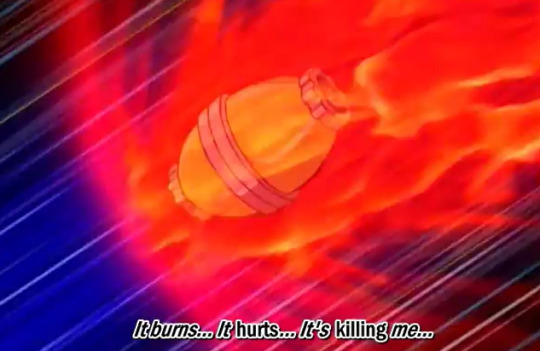
Yubel connected to his dreams called out for Judai every night, only for Judai’s parents to give him surgery that repressed his memories of Yubel causing him to forget them entirely. Yubel then spent the next ten years alone in space, continuously subjected to painful torture, with their cries for help being ignored.
"I was suffering even as you came to forget about me..."
Yubel is then met with the question of how can Judai treat them this way if they loved him so much? As from Yubel’s perspective, they’ve only ever tried to protect Judai, only for Judai to not only throw them away, but subject them to painful torture and ignore their cries for help. Judai effectively moves on with his life, goes to duel academy, makes friends while Yubel is left to suffer in silence all but forgotten. This is where Judai’s ignorance has serious plot consequences.
It’s not just the pain that Yubel endured that made them snap. It’s that their pain went ignored.
Yubel holds out the faint hope that Judai will answer their calls fro help until they finally burn up upon re-entry into earth’s orbit. At which point they’re left as nothing more than a single hand crawling on the ground. Yubel who cannot fathom why Judai would cause them so much pain, and then forget about them, convinces themselves that Judai must be causing them pain, BECAUSE he loves them.
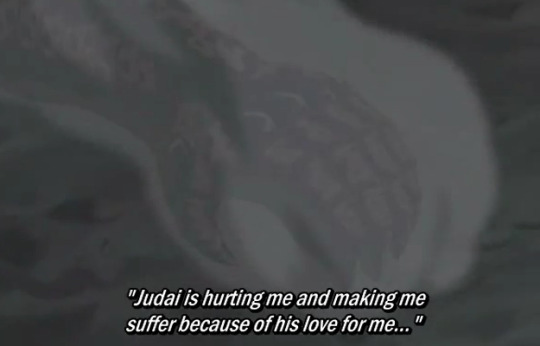
But you see, I couldn't possibly forget about you in the time that I've suffered...
Judai is allowed to move on with his life, to make friends, to spend the next ten years doing so while Yubel is subjected to ten years of agony. When they finally escape their painful torment, they see all the friends Judai has made while they’re left alone and forgotten. However, Yubel’s goal isn’t revenge. Rather, it’s to make Judai share and recognize their pain. WHich is why I said it’s not the fact that they were made to suffer, but their suffering is ignored. Yubel’s entire philosophy revolves around the idea that sharing pain is an expression of love, and that they and Judai share their love for each other by hurting each other.
"That's why I sought to fill all those linked to you, your world, with both sadness and anguish..."
For Yubel, making all of Judai’s friends suffer and Judai themselves suffer is a way of making them and Judai equals again. They want to show “their love” for Judai, but it’s more about forcing Judai to recognize the pain he’s caused them by forcing him through the same pain. Yubel’s philosophy of sharing pain is actually a twisted form of empathy.
They’re not entirely wrong either, that even people who love each other can cause each other pain, and that if one person is suffering alone in a relationship or the suffering is one-sided then there’s something wrong with that relationship.
Yubel: I get it now… You weren’t in love, with Echo. Yubel: No.. you may have loved her just enough to clear the conditions in palace for you to control Exodia, but the you didn’t truly love each other. Yubel: You were only unfairly hurting her, while you stayed unharmed. You wouldn’t suffer. You wouldn’t suffer. You wouldn’t be in pain. Amon: What are you getting at? Yubel: I’ve been hurt! I’ve suffered! I’ve been in pain. That’s why I’m making JUdai feel the same things I did!
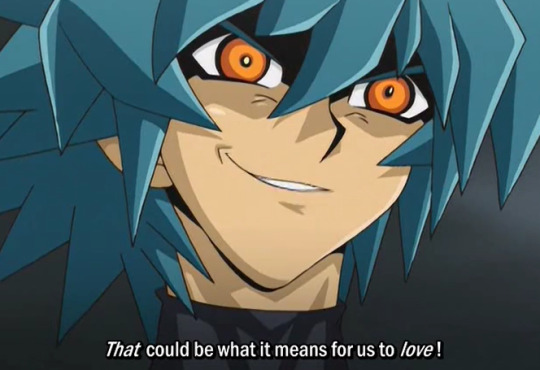
Yubel’s twisted theory of love, is a pretty thinly veiled cry for empathy.
They break out into tears when talking to Amon about the way they’ve hurt and suffered. They clearly state upfront that their goal is for Judai to recognize their love. One of the first things they say to Judai is a plea for Judai to remember them.
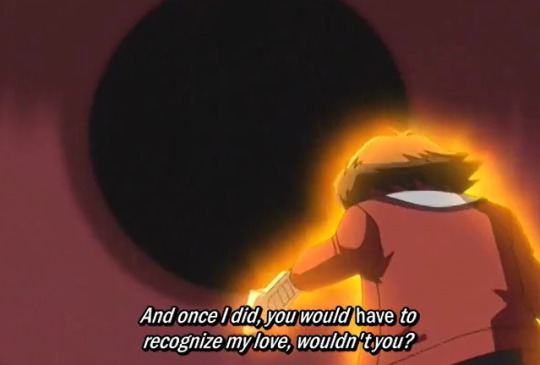
Yubel is presented as a very human character suffering through a lot of pain throughout their entire villai arc, they break down into tears multiple times, they cry out in agony, they're visibly suffering and you see their mental walls begin to break down when Judai denies them any empathy.
Yubel is actually incredibly clear and straightforward about their desire to be saved by Judai. However, Judai doesn’t lift a single finger to help Yubel the entire arc, even though they themselves admit they are directly responsible for Yubel’s suffering but they helped create who they are today.
Judai plunges into a different dimension and gives up everything to save someone, but it’s Johan, not Yubel they try to save. You have Johan, the perfect friend, and perfect victim that Judai gets obsessed over and will not stop at anything to save, and then you have Yubel, the imperfect victim that is actively harming Judai and all of his friends that Judai chooses to ignore. The whole season Judai only focuses on saving the perfect victim Johan, and this is clearly shown to be a flaw. Judai doesn’t just ignore Yubel to save Johan, he also ignores every single one of his friends.
Judai only caring about saving Johan, and deliberately ignoring and abandoning the friends who came with him to help, essentially abandoning them the way he did Yubel leads to another consequence. After he abandons them they get captured, rounded up, and actually die and become human sacrifices.
Losing his friends, causes Judai to snap. Judai becomes the supreme king and decides power is all that matters; he starts killing duel spirits en masse in order to forge the super polymerization card. Which means being left alone, suffering alone, being abandoned by everyone causes Judai to snap the exact same way that Yubel did.
In fact Judai is only saved from his darkest moment, because two of his friends sacrifice their lives, trying to get through to him and appeal to his humanity. At that point Judai’s friends could have just chosen to put him down like a mad dog, to punish him for the amount of people he’s killed, but instead they try to save him because of their friendship.
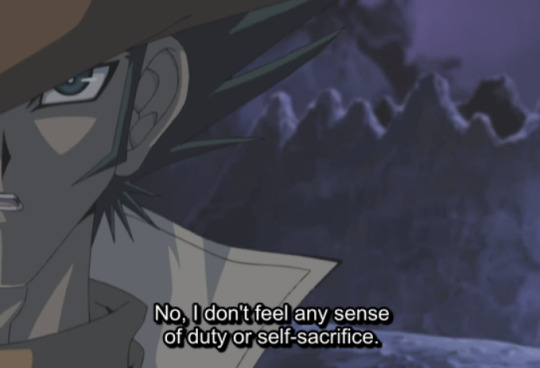
I just want to save my friend. That is all.
By the time Judai is facing Yubel in their final fight, Judai doesn’t have the moral highground against Yubel in any way whatsoever. They’ve both lashed out because of the pain they endured and killed countless people in the process of lashing out. The only real difference between them is that Judai is lucky. He had friends to support him at his lowest point, while Yubel didn’t. Does Judai learn from Jim’s example, and go out of their way to save Yubel the same way they were saved because Yubel is still a friend? Nope, Judai tries to kill Yubel at this point.
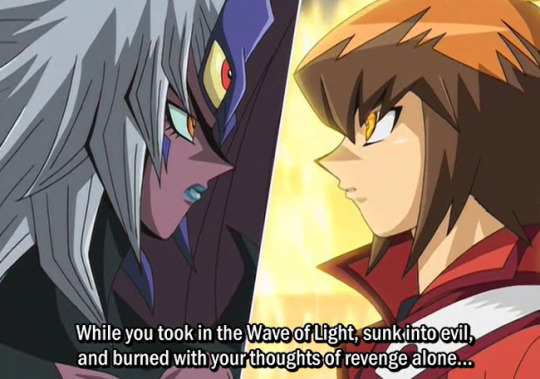
I made a lot of friends... And they all taught me something… real love is wide enough, large enough and deep enough to fill the universe. Your so-called love is only a conceited delusion.
Like, Judai, sweetie baby honey darling. How was Yubel supposed to make friends when they were floating in the empty void of space?
Judai hasn’t learned, they are still ignorant, and still turn a blind eye to Yubel’s suffering. After all if his love is wide enough, large enough,and deep enough to fill the universe then why don’t thy have any room in their heart whatsoever for empathizing with Yubel?
Judai making friends while Yubel was trapped in space doesn’t make Judai a better person than Yubel, it makes Judai lucky. Judai doesn’t even appreciate that luck, because he treats his friends like garbage. It’s not about whether Yubel is worthy of salvation, because Judai is a mass murderer and his friends still went to great lengths to save them anyway. It’s that Judai doesn’t want to empathize with Yubel, because they still want to remain ignorant and irresponsible. Judai wants to continue playing hero, with a very black and white definition of what a hero is. By this point Judai’s killed lots of people, but if he makes Yubel the villain in the situation, he can keep playing hero. He doesn’t have to look at himself and what he’s done, because blaming everything that happened on Yubel and then putting Yubel down like a mad dog allows Judai to absolve his own guilt. Judai practically ignores Yubel’s cries for help, even when Yubel spells it out for them.

I couldn't have lived with the heartache unless I felt that I was being loved...
At this point Yubel themselves acknowledges that their love was just a delusion. That it was a coping mechanism, because they couldn’t live with all the pain otherwise. WIthout it they would have just died, which makes Judai unmoved. The implication here is that Judai thinks yes, Yubel should have just died in that crater. It would have been easier for Yubel to die a perfect victim, then for Yubel to crawl out of that crater and go on to hurt other people. While that may be true the same can be said for Judai - it would have been better if Judai died rather than become the Supreme King. His friends could have put him down like a mad dog, you could have even called that justice - but they didn’t. Judai making no attempt to save Yubel isn’t because he thinks it’s morally wrong to save someone who’s killed as many people as Yubel has, or because he thinks he can’t forgive Yubel, it’s because Judai is taking the easy way out. Johan is a nice, easy victim to save, because he’s Judai’s perfect boyfriend, while Yubel is a complex victim that requires Judai to understand their suffering. Even the act of saving Johan isn’t about Johan himself, it’s about the fact that Judai feels guilt over Johan’s disappearance. What Judai wants isn’t really to save a friend, but to stop feeling guilty over that friend. Judai isn’t just disgusted by Yubel’s actions towards his friend, he also wants to avoid the guilt he feels over causing all of Yubel’s suffering, because it requires acknowledging the complex reality that he is both victim and perpretrator in this case, just as Yubel is both victim and perpetrator.
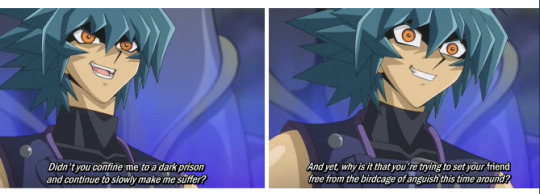
So how can an arc where Judai doesn’t try to save Yubel until the last possible minute, be better than an arc where Deku makes it his goal for the final act of the manga to save the crying boy in Shigaraki?
It’s because the story does not let Judai get away with his continual refusal to empathize with Yubel. Yubel’s entire character revolves around empathy, in the form of sharing pain. As a duel monster, Yubel’s effect is that they are a 0/0 attack monster who is immune to all damage, but when you attack them they deal all the damage back to you. Which means that Yubel will respond to all the pain they feel, by causing you just as much pain in return. Yubel is not a character who can be defeated in a fight, or a duel. In fact they’re the only Yu-Gi-Oh villain who never loses a duel once. The most Judai can do is duel them to a draw, and they draw three times. Yubel wins against everyone else who challenges them. In a way Yubel is like Shigaraki, the ultimate, unkillable enemy that can’t be done away with violence. Judai’s refusal to empathize with Yubel or attempt communication also makes them worse, every time Yubel is hurt they escalate. THe more Judai hurts them, the more they will hurt in return, it’s a cycle that will never be broken simply by killing Yubel, because Yubel is unkillable.
Not only that but the story has gone to great lengths to show that saving Yubel is the correct course of action. If Judai doesn’t save Yubel, he’s basically spitting on the selflessness Jim showed in saving him. In fact if he doesn’t save Yubel, Judai is contradicting his own words on what makes a good friend. Sho once asks Judai after witnessing his brother change, what he should do if a person you lov ehas changed into an entirely different person. What if they're a person you don't even recognize any more? A person you don’t even necessarily like anymore?
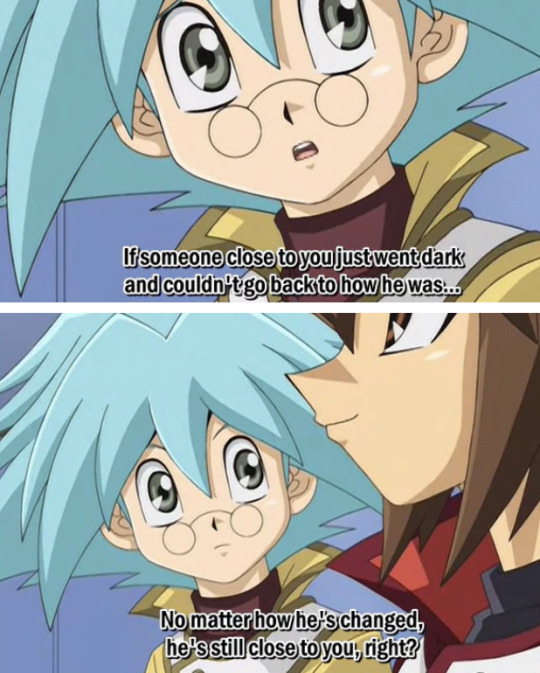
That's why if it were me. I'd probably just be looking after him until the very end, even if I didn't like him. I'd do it cause I think it'd prove that I care about him.
Judai doesn't even say that Sho is obligated to save his brother or morally redeem him, just that he has to keep looking at him instead of turning away or ignoring him.
Judai is being a bad friend, by his own definition. By choosing to deliberately look away from Yubel, Judai’s not living up to his advice for Sho for how you treat people you care about.
Which is why the resolution for Judai and Yubel’s arc is so important, because it’s done by Judai finally acknowledging Yubel’s pain, and promising to watch over them from now on, words that are followed by the action of physically fusing their souls together so they’ll never be alone again. Judai doesn’t just say pretty words about how they won’t ignore the crying child inside of Yubel, but instead he makes a sacrifice to save Yubel at risk to themselves to show their words are backed up by actions. Judai says Yubel will never be alone again, and then he commits.
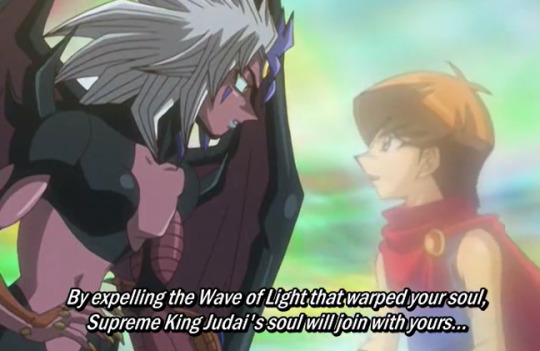
"And even if that means I won't exist anymore... I don't care."
Judai has resolved his character arc by this action, because Judai is finally taking on responsibility and that responsibility is watching over Yubel, so the two of them can atone together. Judai even says himself this isn’t an act of sacrifice on his part, but rather him finally accepting adult responsibilities.
Judai: I wouldn't sacrifice myself for you guys. I'm just going on a journey to grow from a kid into a man.
Judai needed to save Yubel to complete his character arc and grow as a person. If Judai hadn’t saved Yubel, he would have still remained an ignorant child. By learning not to turn a blind eye to Yubel’s pain, and also smacking sacrifices and physically doing something to atone for the way they ignored Yubel up until this point they’ve not only saved Yubel they’ve also done something to address their wrongs. This also continues into the fourth season where Judai’s personal growth results in him learning what kind of hero he wants to be as in Season 4 in order to atone for the spirits that Judai slaughtered, he decides to leave his friends behind and walk the earth with Yubel helping spirits and humans get along with each other. In fact Judai’s final speech as a character isn’t even about how strong he is as a hero, but how weak he is as a person.
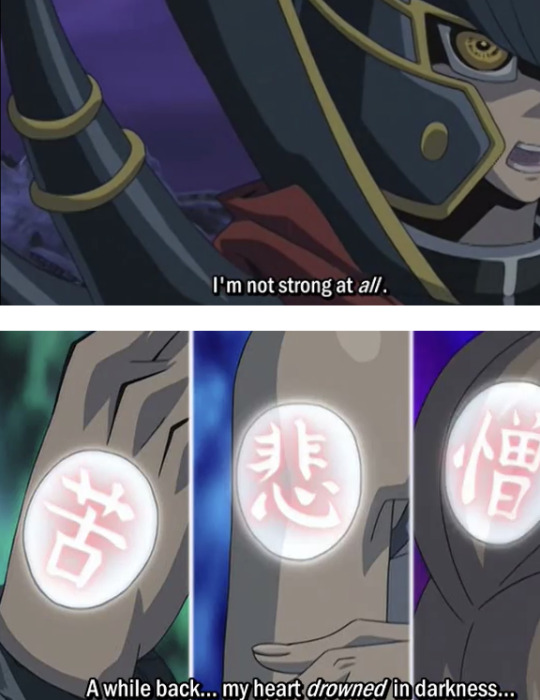
And I put my friends through some rough times. Form that, I figured a few things out... all I can do is believe in them.
The lesson Judai learned is because he’s weak, he needs to empathize and believe in other people the same way that his friends once believed in him when he was at his lowest point. Judai’s not the strongest hero, he’s the weakest one, but that gives him the ability to empathize with people who were lost just like he was, and guide them back from the darkness.
The story of how Deku became the worst hero.
I’m going to say this right now it might turn out next week that Shigaraki is just fine, and he’ll use the overhaul quirk to reconstruct his body. However, even if that happens Deku has completely failed at his goal of saving Shigaraki for the reasons I’ll illustrate below. In theory, Deku’s arc of saving Shigaraki, and therefore winning by saving should be much easier for the story to accomplish and also much less frustrating to watch. After all, Shigaraki has been around since the beginning of the manga, he’s literally the first villain that Deku faces. He’s also the first villain that Deku talks to, where he brings up the idea that there were some people All Might failed to save. There’s also many intentional parallels between the two characters, the entire manga is about their parallel journeys of becoming the next generation hero and the next generation villain. Shigaraki even directly quotes the line at one point that all he wanted was for someone in his house to tell him he could still be a hero, the same line Deku said in the first chapter was that he wanted his mom to tell him to be a hero instead of apoalogizing to him for being quirkless.
Not only is the setup for Shigaraki and Deku made obvious (Deku can redeem Shigaraki by telling him that he can still be a hero too), but Deku himself states out loud that he wants to save the crying child inside of Shigaraki.
Judai runs away from Yubel the whole time, whereas Deku is running towards Shigaraki and actively makes it his goal to understand Shigaraki and continue to see him as a human being rather than a villain. The story also makes it clear that saving Shigaraki is necessary to saving hero society as a whole. After all Yubel is just Judai’s victim. Whereas Shigaraki is the victim of all of society. He’s the crying child who was ignored. The cycle won’t be broken if heroes continue choosing to ignore people like Shigaraki, because more victims will grow up to replace him.
Shigaraki: Everything I've witnessed, this whole system you've built has always rejected me. Now I'm ready to reject it. That's why I destroy. That's why I took this power formyself? Simple enough, yeah? I don't care if you don't understand. That's what makes us heroes and villains.
Shigaraki rejects the world because the world continues to reject him. THe solution to this problem is not rejecting Shigaraki, because Shigaraki won’t go away, the system will just continue to reject people like Shigaraki. As long as heroes and villains don’t understand each other, they’ll keep being forced to fight and the conflict won’t end, because hero society is what engineers it’s own villains.
clear as day by the story itself. If the objective of saving Shigaraki is clear, then how exactly did the story fail in this objective? What went wrong? In this case it’s a failure of framing, and breaking the rules of “show don’t tell.” Stories are all about actions and consequences. When a character makes a certain action in a story, the way other characters around them, the world, and whatever consequences that action frames that action in a certain light. It provides context for how we are supposed to interpret that character in that moment.
For example, when a character does something wrong and another character directly confronts them over what they did wrong, that frames them as in the wrong. The story is criticizing the character for what they did wrong. Context is everything in a story. Stories are just ideas, so they require framing and context to communicate those ideas for the audience. Certain character attributes can be strengths or flaws depending on the context. My go to example is that if you put Othello in Hamlet, the conflict would be resolved in five seconds because Othello’s straightforward personality and determination would have him kill Hamlet’s uncle without questioning things. Whereas, Hamlet constantly questioning and second guessing himself would lead to the worst ending possible. However, if you put Hamlet in Othello, then Hamlet wouldn’t fall prey to Iago’s manipulations, because Othello doubts and questions everything so he wouldn’t believe Iago the way Othello did.
Hamlet’s contemplative and introverted nature can be a strength in one situation, and a flaw in another. Othello’s tendency to act without thinking things through can be a strength in one situation, and a flaw in another. Context matters, because context tells you how you’re supposed to interpret a certain characters actions, and therefore tells you more about that character. This is why people repeat “Show don’t tell” as the golden rule of storytelling, it’s one thing to say something about a character, it’s another to us the characters actions in the story itself to show them something about the character.
What’s even worse then breaking the rules of show don’t tell however, is telling the audience one thing, and then going onto show in the narrative something completely different. In that case the narrative becomes muddled and confusing to read. If I the narrator say “Hamlet is someone who overthinks everything” and then in the story Hamlet walks up to his uncle and kills him with no hesitation, then the narrator is straight up unreliable. It becomes impossible to tell as an author what message I’m trying to get across about these characters, because I’m telling you one thing and showing another.
This is why the writing fails in the second half of My Hero Academia because we are constantly told one thing, but then the story shows something entirely different and sometimes even contradictory to the thing we are being told.
Judai is a much worse hero than Deku, he always runs away from Yubel, and we’re never directly told that he’s supposed to save Yubel either. However, the narrative is incredibly consistent. Judai’s behavior of running away is consistent with his character. All the other character call Judai selfish for abandoning his friends (and they’re not even talking about Yubel). Judai is never painted in any positive light for his actions, therefore we as the audience understand Judai’s behavior is wrong and he needs to fix it. The narrative makes it clear that Judai needs to grow up, and Judai is never rewarded for his refusal to grow up, he’s ruthlessly chewed out, not by his enemies but also by his own friends. However, the narrative isn’t merciless on him either. Season 3 of GX is dark, but it’s not grimdark. Even when Judai loses his way, he’s still shown love and compassion by those same friends who go to great lengths for his sake. The narrative criticize Judai but it never insists that he’s beyond redemption and needs to be put down like a mad dog.
The message is very clear, that not only does Judai need to grow up, but he also deserves the chance to grow and change, which is why he should give Yubel a similar chance. In comparison the story sets out this clear narrative arc for Deku of understanding Shigaraki, but it never challenges him for failing to understand Shigaraki. If you listen to what the narrative says, how other characters describe Deku, and what Deku himself says and only read it on a surface level then yes, Deku’s goal is to save Shigaraki. If you analyze actions however, he is in effect just like Judai he never takes any meaningful action or steps towards Shigaraki, nor does he think of what saving Shigaraki might look like or entail.
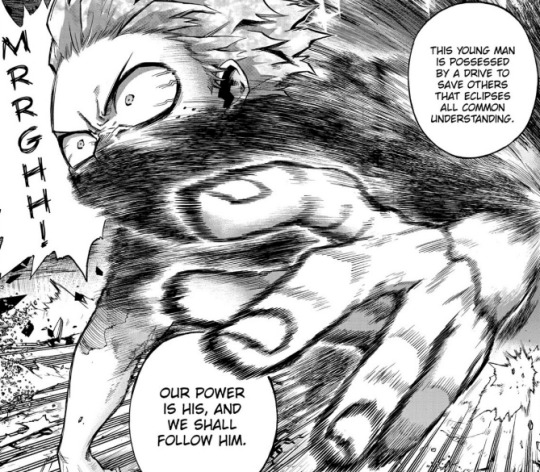
The story describes Deku as someone who is possessed by a drive to save others that eclipses all common understanding, but does the story give us any examples of that behavior?
Judai is characterized as a selfish, irresponsible child, and the story gives us countless examples of his immaturity and how it hurts others. Does the story of MHA do the same for Deku's purported virtues? Let’s run through Deku’s actions, step by step, the actions themselves and how they are framed in order to find any evidence that Deku possesses this drive to save others. Does Deku reflect at all on the question of:
Can Shigaraki be Saved?
Deku leaves on a journey to try to understand villains. When he makes a perfunctory attempt to understand and empathize with Muscle, and Muscle replies that some people are just evil does Deku keep trying to reach his heart? Nope, he just punches him.
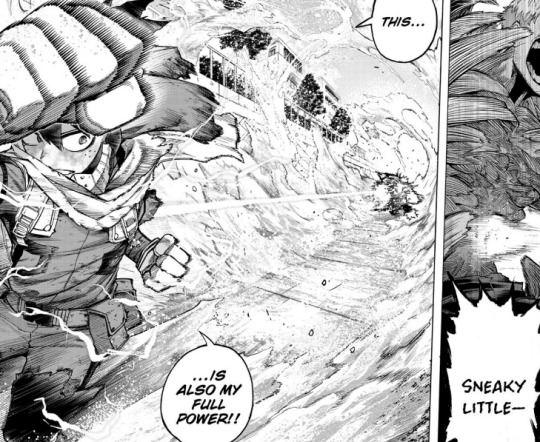
Well, if he’s failed in his goal of understanding a villain then does the story call him out on his failure? Does Deku face any sort of narrative consequence for that failure? Is he framed negatively for failing to understand Muscle, the same way that Judai is framed for abandoning Yubel? Nope. Deku doesn’t express any frustration at all over is inability to reason with Muscle. There’s also no negative consequence for Deku just choosing to punch muscle, it turns out that there was no reasoning with Muscle and some people are just bad eggs so Deku was right. It’s okay for characters to fail, but if a character fails and it’s not framed by the story as a failure then the writing itself as failed. Why even bother to include this scene in the first place if it doesn’t advance Deku’s character in any way? This scene in spite of showing Deku failing to understand someone actively paints Deku in a positive light, because of how much stronger he is ow that he can OHKO a guy that gave him trouble all the way back in the camp arc.
This scene doesn’t tell anything about Deku as a character, it just makes him look cool. In fact that’s precisely the problem, Deku isn’t adequately challenged as a character, because he’s never allowed to fail. Even when he does obviously fail at the things the narrative set out for him to do, he’s never challenged on those failures, because the priority isn’t to make Deku grow, it’s to make Deku look good. As I said before, Judai is the hero because he’s the weakest. Deku is the hero because he’s the strongest. Well, next a big flaw on Deku’s part is that he worshippd the same heroes that were making the world corrupt. Heroes like Endeavor who created people like Dabi. So, does Deku take action to either criticize the older generation of heroes, or separate himself from them in order to try to be better than them? Nope, he teams up with them. Not only that, Deku can’t do something as simple as tell Gran Torino out loud about his plans to save Shigaraki. If Deku feels that Shigaraki is worthy of salvation then he should at least try to make an argument here about his ideal of saving others.
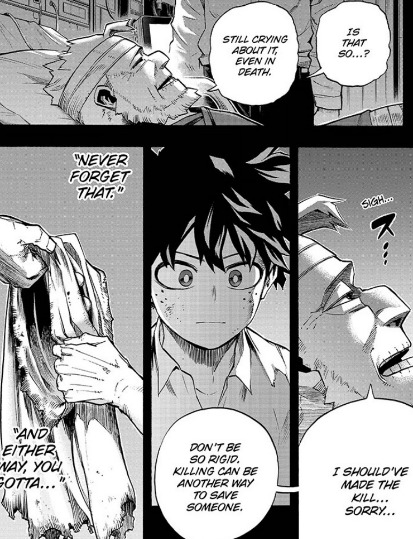
Now here’s the thing, if Deku hadn’t directly looked at the camera and told us he wanted to save Shgiaraki, would we be able to deduce his intentions from his actions? If you took away all of Deku’s internal monologue, and just showed him punching Muscular and saying nothing when Gran Torino says he may have no choice but to kill Shigaraki would anything about Deku’s actions indicate that he wants to save Shigaraki? Let me use avatar the last airbender as a positive example for a moment. People say that Aang’s desire to spare Ozai’s life comes out of left field, but like if you analyze Aang as a character down to their bending, and the way they react in situations they always prefer de-escalation, or taking a third option as opposed to confronting things head on. It’s literally why Toph says Aang has trouble learning earth bending, because as an airbender, he always tries to look for some other way to solve the problem, instead of a direct confrontation with force. As early as season one, Aang tells Zuko someone who has tried to kill him several times that he was friends with someone from the fire nation one hundred years ago and in a different situation they could be friends. Aang’s desire to save the Firelord may not have been told to us until the last possible minute, but Aang’s aversion to violence has always been a part of his character from the beginning. However, Deku never shows any similar aversion to violence. There’s basically no example where he ever tries to de-escalate a situation, or he avoids a conflict by seeking a third option.
Anyway, let’s move onto the next example. In the confrontation where Lady Nagant fights Deku, when Deku learns the fact that the heroes were employing government hitmen to attack people for uhh… exercising free speech does Deku give any reaction to this information? When Lady Nagant says that Deku is only going to bring back the status quo, does he show her any meaningful evidence that he won’t do that.
Deku’s response is because the world is so grey, he needs to extend a helping hand to others. Which you know what thay could be a response. Deku saying that his response to the corruption of the hero world is that he now understands that society led some people down the wrong path, so his way of addressing the wrongs of that society is lending a helping hand to as many people as possible even people he used to think was irredeemable.
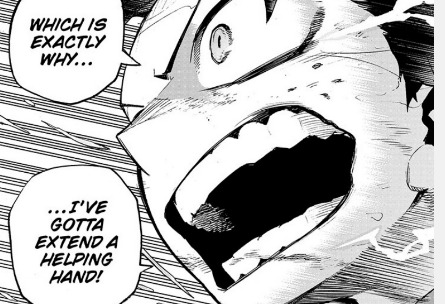
I will give Deku the benefit of the doubt, I think this is an acceptable answer. I can’t save everyone, but that’s not going to stop me from trying to save as many people as possible and maybe I can save people who were this society’s victims on the way too. However, does Deku demonstrate his resolve to extend a helping hand in any meaningful way.
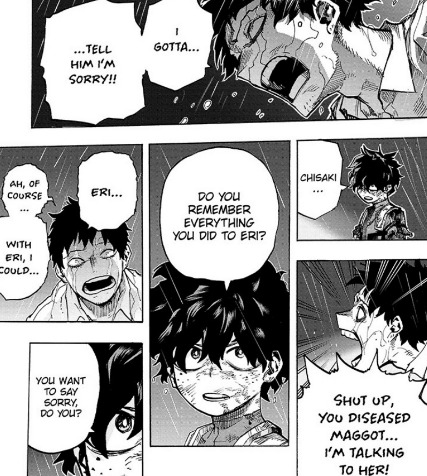
Deku is met with an armless, insane Overhaul who’s begging for someone to help heal his father figure in the Yakuza from his coma. This isn’t like Muscular who insists that there’s no helping him, Deku is met face by face with someone asking him for help. Deku’s gotta extend a helping arm whenever he can, because he knows some people were abandoned and led astray by this society… Unless that person is someone he doesn’t like personally. At which point he only helps them on a conditional basis. We are told Deku will save anyone and everyone, but Deku is met face to face with an armless man who is begging for help and Deku’s does nothing to help him. Deku’s not criticized for refusing to help overhaul either, it’s never brought up again. When Deku begins to experience a mental breakdown because of all the people he’s trying to help in the Dark Deku arc, we are told this is the result of Deku trying to save everyone, but we do not see Deku attempting to save a single villain after Muscular and Nagant.
He exhausts himself beating up villains that AFO sends after him, and only helping innocent civilians. Which would be fine if this arc were about how Deku is running away from his real responsibilities the same way that Judai was running, but that’s not what we’re being told. We are told that this is all part of an arc of Deku learning to understand villains and be a hero.
Deku is asked “Can you save Shigaraki?” by the story, but Deku never at any point has to deliberate on that question. Judai doesn’t deliberate on that question either, but him choosing not to think about things and stay ignorant is the point.
It’s actually fine to make Deku stagnate as a character. It’s fine to have him take the easy way out by just punching villains and giving up on them after one conversation. It’s fine for him to be empathetic to other people’s suffering, or even self-righteous. It’s fine for him to be ignorant.
He could be all of those things if it was a part of a narrative teaching him to unlearn his behavior. In fact the narrative might have been better if Deku started out by saying he didn’t want to save Shigaraki, that there was no choice but to kill him, because then at least his actions would be consistent with his words. Then his lack of empathy and his tendency to resort to violently beating up villains instead of avoiding violence would be character flaws he could work on. Deku however, is presented to us as this empathic hero who is always willing to give others a second chance though he never actually sticks his neck out in order to do so. Continuing on with our slow crawl through MHA, one of Deku’s friends is revealed as the traitor. Deku has a heartwarming scene fo saying that Aoyama can still be a hero, but look at his actions. He lets the adults in the room physically tie Aoyama in a straightjacket and imprison him, for the crime of… doing bad things while he was in a hostage situation. Apparently, if a bank teller helps the bank robber by giving them money when the robber has a gun to his head, the swat team should just snipe the bank teller. Not only does he not defend Aoyama against the adults, or stand up for him, or tell the adults they’re wrong to treat Aoyama a clear cut victim who had a gun to his head and was bing held hostage like he’s a villain - he also lets the adults use Aoyama an innocent victim as bait in order to lure out AFO. Deku tells Aoyama he can still be a hero, but he doesn’t defend Aoyama as a victim of being taken hostage, nor does he stop the adults from further taking advantage of him and throwing him right into danger. Some people are just led the wrong way that’s why they need to be extended a helping hand, but fuck Aoyama I guess. He needs to earn the right to be sympathized with by physically putting his life in danger.
Deku can’t even go out of his way to save a friend who he’s known for the better part of a year, when that friend is a complex victim forced to do bad things.
Then Deku and Uraraka have a conversation where they both, kind of ruminate on the idea that maybe the villains are human beings who are worthy of sympathy.
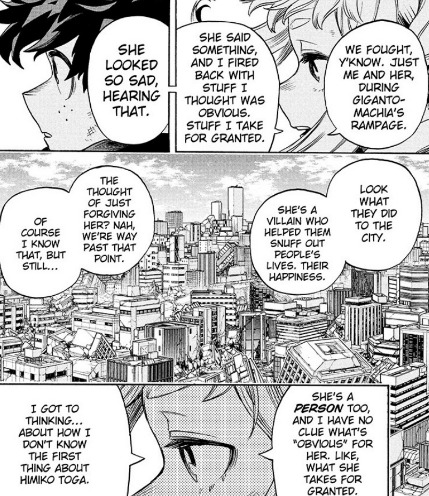
In fact Uraraka is actively trying to dehumanize Toga by looking at the destroyed city, so she won't have to think of Togaas a person.
The language here is also a major fault of this arc. It focuses far too hard on “forgiveness” over and over again. As I said before, saving Shigaraki isn’t about Shigaraki at all, it’s about Deku, and how he wants to use his power as a hero. Deku has even stated himself that he doesn’t believe that OFA is a power that should be used for killing people. So why does whether Toga or Shigaraki are forgivable or not even matter? It’s the same with Deku refusing Overhaul any sympathy. If he’s so morally opposed to abusers, then why does he work with Endeavor and defend him at every visible opportunity, even in front of his victims? Whether or not Deku can forgive Shigaraki doesn’t matter, because Deku is not the moral arbitrator or right and wrong. In fact Deku doesn’t even have any morals, so how is this a moral debate? Is there any point where Deku gives a clear definition of what he thinks right and wrong is? Does he quot Immanuel Kant to the audience?
Batman doesn’t kill people, not because he thinks that every last person on earth can be saved, but because Bruce Wayne an incredibly rich white man thinks that maybe he shouldn’t have the authority to decide who lives and who dies. When Bruce doesn’t kill the joker, it doesn’t mean he thinks the Jokers actions are forgivable, it’s because Bruce thinks it’s not his place to determine whether someone has the right to live.
The whole conflict that MHA presents us is that heroes pick and choose who to save, and only save the ones they deem as innocent. So, how does Deku saying repeatedly they can’t forgive Shigaraki contribute to that theme in any way? In fact by focusing on forgiveness, rather than whether or not he personally has the right to pick and choose who lives and who dies Deku is ignoring the elephant in the room. The question isn’t about whether Shigaraki’s redeemable or if his deeds should ever be forgiven. The question is whether Deku has the right to decide who gets saved and who doesn’t.
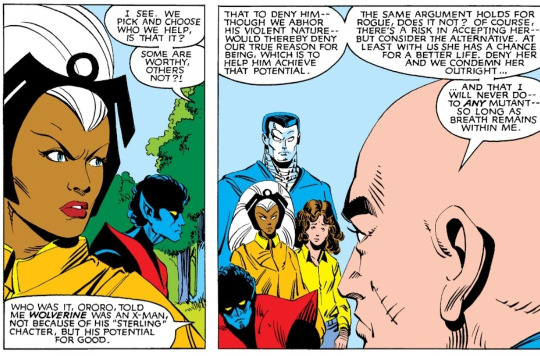
We are told that Deku as a character is someone who wants to save everyone no matter what, so Deku shouldn’t be focusing on whether or not Shigaraki is worthy of forgiveness, he should be making an idealistic argument like Xavier does in this panel. Why doesn’t Deku talk out loud with Uraraka on how he believes his power is for saving others, and not killing? If he’s meant to represent some idealistic hero, then why doesn’t he even talk about his ideals? Why don’t I as the reader know what those ideals are?
I think Xavier’s ideals of forcing the X-men to provide a good example to the mutant community, in order to try to earn the respect of other human beings is wrong, but at least he has ideals. He tries to inspire the other people around him to live up to those ideals. The story can criticize him for his ideals and point out how they’re wrong, while it can also uplift parts of his idelogy like where he believes there are no evil mutants. Deku has a chance to do the same to Uraraka, to tell her clearly, “I don’t think we as heroes have the right to pick and choose who we help…?” but he waffles. Not only does he waffle, but this moment is meant to be read as an indication that both Deku and Uraraka are sympathetic individuals who want to save their villains. They are supposed to look good and idealistic here and they don’t. For Deku it just seems like a repeat of his behavior with Overhaul. The only villains that are worthy of sympathy, are the ones that he personally decides are forgivable.
The story isn’t about whether or not it’s moral to save someone who’s killed as many as Shigaraki has. The story never seriously discusses any sort of complex morality or moral philosophy. Once again to bring up avatar, yes you can argue Aang sparing the life of a war crimminal is bad, but Aang mentions on multiple occasions that he wants to retain the cultural values of the airbending people. Aang has a morality, a consistent morality, it might not be a morality you personally agree with but at least he has one. Deku hates abusers, unless he’s next to Endeavor then he thinks abusers should be given the chance to atone. Deku doesn’t believe that One for All is a power for killing, but he never stands up to any of the adults who are blatantly trying to kill Shigaraki, he doesn’t even express out loud to Uraraka that he doesn’t think heroes have the right to decide who lives and who dies. In fact he’s given the perfect opportunity to, when Hawks kills a villain and it’s broadcast live on the news in font of everyone, but Deku never has anything to say about that. The reason Deku and Uraraka both put such an emphasis on “forgiving” their villains has nothing to do with the story itself. It’s because the author Horikoshi, is afraid that some people will misinterpret his story as saying that he actually thinks that saving a villain like Shigaraki means that he condones mass murder, so he has to have the characters talk about not forgiving Shigaraki.
Judai doesn’t have any consistent morals either, but once again that’s the point and something the story relentlessly calls him out on.
Cobra: Fortune would never smile on a fool like you who fights while prattling on about enjoying duels. Cobra: You are certainly a talented duelist. But you have one fatal flaw. Judai: A fatal flaw? Cobra: Yes, your duels are superficial. Someone who fights with nothing on his shoulders, cannot recover once he loses his enjoyment. What a duelist carries on his shoulders will become the power that supports him when he's up against the wall! Cobra: But you have nothing like that! Those who go through life without anything like that cannot possibly seize victory. Cobra: But I know that nothing I say will resonate with you... because you have nothing to lose but the match. Judai: I... Cobra: Afraid aren't you? Right now, you have nothing to support you.
Judai’s regularly called out for his superficiality. Judai is only a hero because he’s strong and wins fight, he doesn’t feel any responsibility towards other people, and in fact he loathes having to feel responsible for others. Judai isn’t just naive, he deliberately chooses to remain ignorant. Since he’s ignorant of his own faults, he makes awful decisions when it comes time for him to lead, and his friends die because of choices he made. We are told that Deku doesn’t want to remain ignorant, that he wants to understand villains, but Deku’s actual actions are him continuing to ignore society’s ills and the suffering of victims. In fact if you take away Deku’s internal monologue and the narration, Deku’s actions almost exactly mirror Judai’s.
Deku is just as superficial as Judai, and he also doesn't want to spend any time thinking about what kind of hero he wants to be, but the narrative never punishes him for it.
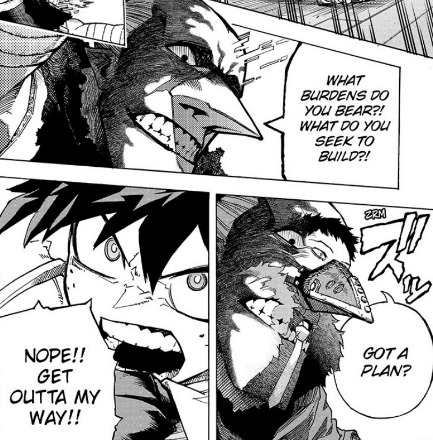
Judai is asked what burdens he has to bear and he has to meaningfull answer that question, Deku is allowed to get away with not having to think about anything. Deku remains superficial. Both Judai and Deku spend the entire arc running away from their villain rather than confronting them in any meaningful way. They both never express out loud any sympathy for their villain, or try to empathize. THey both never step down from the role of hero, and only confront their villain as a hero, because they don’t want to think about themselves as complicit or in the wrong. Shigaraki and Deku’s final confrontation mirrors Judai and Yubel’s but without the same clear framing. THe entire time Yubel is trying to get Judai to empathize with them, and Judai only responds with physical violence, because they don’t want to stop being the hero and because they can’t see Yubel as anything other than the villain. As soon as Deku arrives on the battlefield (by the way everyone else and their mom pointed this out, but Deku who doesn’t think OFA is a power for killing, is completely okay with a plan called the “Sky coffin plan” where every other hero was clearly trying to murder Shigaraki).
When Deku arrives he asks if Shigaraki is still in there, but he doesn’t do anything to try to reach Shigaraki, he jumps right to punching him. In fact he never tries anything besides punching him as hard as possible. How is punching Shigaraki with the force of a thousand suns saving him exactly? How is that different from how he tried to defeat Shigaraki the last war arc, before he saw the image of the crying child that made him want to try a different approach in saving Shigaraki? In Judai’s final fight with Yubel, it’s made explicitly clear that Judai is not trying to save Yubel, and that’s a fault on his part. In fact Judai gives the traditional “I have friends, and you don’t” speech to Yubel but it’s a subversion of how that speech is usually used. Usually that speech is used to show that the protagonist won because of they valued friendship,while the villain treated their friends poorly and only cared about power. However, it’s ironic in this case because Judai got all of his friends killed. Judai treats his friends like garbage. This speech isn’t used to show that Judai is winning because he values his friends more than Yubel does, it shows that Judai is a hypocrite, playing the hero in this situation where they are just as bad as Yubel. Judai’s not morally superior, he’s just lucky that he has good friends. Friends that were willing to save him. The only connection Yubel has to anyone else, Yubel’s only friend is Judai and Judai is a shit friend.
In fact, Mirio tries to give a version of the “You don’t have any friends” speech to Shigarkai, only for Shigaraki to get mad and tell Mirio that he does have friends and people he wants to protect.
This fact is also something that is blatantly ignored by Deku, even though Mirio tells him about it… even though we are told that Deku is trying his best to see the humanity in Shigaraki.
Judai blatantly admits they’re trying to kill Yubel. Which makes them a worse person, but a better character than Deku, because their actions are clearly framed by the narrative and consistent.
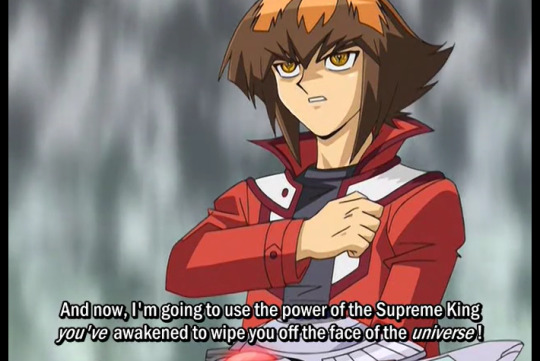
On the other hand we are told that Deku doesn’t want to kill Shigaraki, and yet everything Deku does makes it look like he’s just trying to kill Shigaraki and put him out of its misery. If we didn’t have Deku stating out loud that he wants to save Shigaraki and wants to see him as a human, there’d be nothing in his actions to indicate that he’s trying to avoid killing Shigaraki. Deku says he can’t pretend he didn’t see Shigaraki crying, but like, does he ever hesitate to punch Shigaraki, does he ever think that causing Shigaraki more harm is wrong when he’s already suffered so much? Deku says that Shigaraki is a person but does he treat him like a person? Does he try to talk to him like a person? To use avatar again, Aang does talk to Zuko pretty early on. Deku doesn’t even give the classic “We could have been friends under different circumstances” speech. When Shigaraki resists Deku’s attempts to see him as a person or emapthize with him, Deku’s response is to just resort to punching harder.
Which is in effect the same thing Judai does to Yubel, just kill them as a villain so they don’t hurt anybody else, but framed in an entirely different light. Judai is shown to be ruthless, and cold in his attempt to only settle the conflict with Yubel by violently putting them down. On the other hand we’re being told that Deku is compassionate and empathic while he punches Shigaraki with the force of a thousand suns.
There’s another eerie similarity between both of these final confrontations. At the climax of the confrontation, both Judai and Deku have a psychic vision where they see events from Yubel and Shigaraki’s childhood. This vision is supposed to help both characters understand the good in the villain they’re facing.
Let’s see the contents of this vision and how the visions change each character. Judai is shown a vision of his past life where Yubel sacrifices their entire body, and even their humanity to go through painful surgery to turn into an ugly dragon, all for the sake of protecting Judai in a previous life.
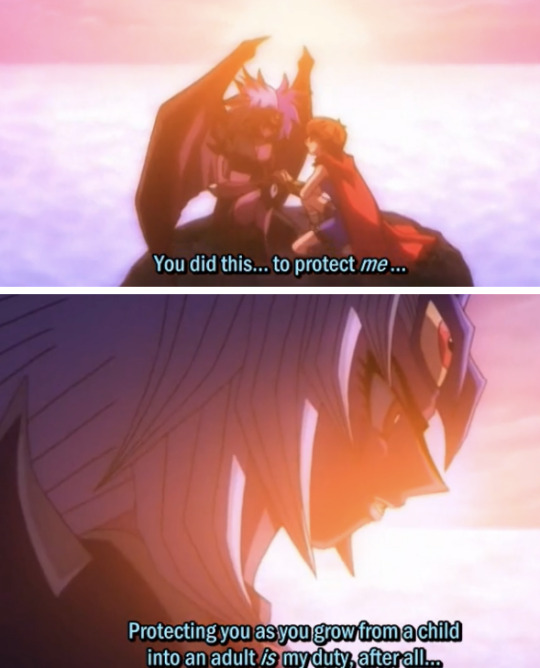
Judai is then forced to witness the good side of Yubel they’ve been ignoring all along to paint them as a villain. Yubel is simultaneously extremely selfish and willing to hurt people Judai cares about, but they’re also extremely selfless and will do anything to protect Judai and have made great sacrifices in the past for Judai’s sake. Deku gives lip service to not ignoring the humanity in Shigaraki, but Judai is literally forced to acknowledge the humanity in Yubel. Not only that, but Judai changes his behavior immediately after learning this new information. After seing the sacrifice that Yubel made for him in the past, Judai responds with a sacrifice of his own. A sacrifice that perfectly mirrors the sacrifice that Yubel once made for him. Yubel gave up their humanity for Judai, so Judai fuses his spirit to Yubel’s, becoming a human / spirit hybrid so Yubel no longer has to be alone.
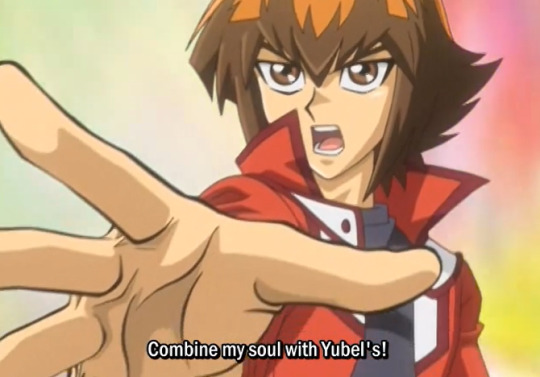
Judai also doesn’t just fuse their soul with Yubel’s in order to stop Yubel from destroying everything, it’s because both of them at this point need to atone together, and Judai is fulfilling his responsibility of watching over his friend until the end to prove that you care about them - as he said to Sho. Judai’s also fulfilling Johan’s dream of helping repair the bonds between spirits and humans, by reconciling with Yubel and repairing their bond. It’s also Judai atoning for his previous behavior of abandoning Yubel, by choosing to stay alongside them as they both atone together. Deku does sacrifice OFA during the fight against Shigaraki, but their sacrifice isn’t to help Shigaraki, but rather doing psychic damage to Shigaraki by using OFA is the only way to defeat them. He transfers OFA in order to break Shigaraki’s brain so he’ll stop reissting and Deku can beat him down. Judai fuses their soul together with Yubel out of empathy and a responsibility they feel to help their friend fater abandoning them, Deku transfers One for All to Shigaraki in order to hurt him and make him easier to punch. It's funny that Deku doesn't travel to Shigaraki's mind to learn more about him, but instead with the specific intent of harming him.
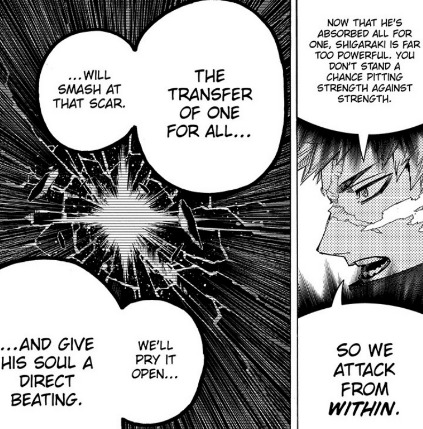
Once he's inside Shigaraki's mind, he doesn't take time to reflect on how Shigaraki used to stand up for bullied kids, or how he wants to be a hero to villains because no one else will stick up for the outcasts in society. No, he only care about Shigaraki when he takes the form of a child crying for help.
In the aftermath of the psychic vision Deku’s behavior doesn’t change towards Shigaraki in any way either. You could say he sacrificed his own arms in order to try to comfort Shigaraki within the depths of his own mind - but that’s not a real sacrifice either because his arms immediately come back. When Judai learns about the sacrifice that Yubel made in a previous life towards him, he stops seeing Yubel as an enemy and finds a way to resolve things peacefully between them. When Deku lanterns that Shigaraki’s a victim of All for One, and that his entire life was a lie, when he sees Shigaraki’s suffering first hand does his beavior twoards Shigaraki change in any way?
When he sees Afo has taken over Shigaraki’s body again, does he try to shout for Shigaraki, to tell Shigaraki to fight from the inside, to reassure Shigaraki that he’s still in there that there’s still good in him? Nope. He just punches Shigaraki some more.
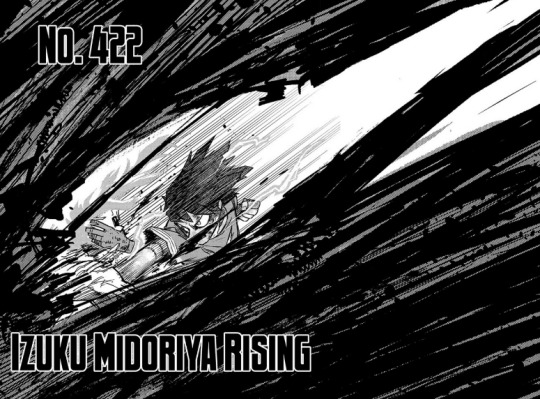
What Deku needed to tell Shigaraki is so obviously set up by the narrative too. Shigaraki wanted just one person in that house to tell him he could be a hero. Deku wanted his mother to tell him he could be a hero if he was quirkless. Deku sees that Shigaraki started out as a boy who wanted to be a hero, and who was manipulated into being a villain but does he try to appeal to the boy inside of Shigaraki by telling him he can still be a hero? Does he now see the good in Shigaraki? Nope, he just tries to kill him by punching him really hard.
I purposefully chose the images for the banner of this post, because it shows how differently MHA and GX treated its villains in the end. Yubel is embraced by Judai in the end, Shigaraki evaporates into dust.
"Judai, now that our souls have become one we will never be separated again. I have now been filled with your love and power. Let us fight together, against the wave of light leading this universe to destruction!"
Shigaraki could so easily have been given the love and empathy that Yubel was shown, but instead their life ends with no show of empathy from Deku, and with them dying believing that their long life of tragedy meant nothing in the end. Shigaraki realizes he's a crying kid, but he's never comforted.
Shigaraki: I only stole my body back from Master, and I didn't destroy anything. "In the end, I was just as you said... A crying kid, huh?"
Yubel is embraced and comforted, Shigaraki disintegrates into nothing.
One of these stories is apparently an optimistic story about heroes saving people, but it ends with the lifelong victim being killed in the most nihilistic manner possible, never receiving comfort, and never achieving anything with his long life.
The other story is a silly anime about card games, shows that when people are alone and suffering they can lash out and do terrible things. That all people are weak especially when they're alone, but the solution isn't to abandon them, or condemn them for their faults, but to believe in them and help uplift them the same way that Judai decides to uplift Yubel so they can atone together.
Which is why Deku gets an F in being a hero. Go directly to summer school. Do not pass Go. Do not collect $100.
#mha meta#ygo meta#mha 423#bnha 423#mha 423 spoilers#bnha 423 spoilers#izuku midoriya#deku#shigaraki tomura#tenko shimura#judai yuki#yubel#soulshipping#yu gi oh gx#yu gi oh
810 notes
·
View notes
Text
The Many Ills of Canon South Korea(as explained by a South Korean)
Ik a lot of people might feel a knee-jerk reaction to this and go "why are you making this? it's been a long time since the character was banned and went into oblivion," and that's true. However, I find that a lot of characteristics of how South Korea was written has been carried on by some Hetalia fans, which are still problematic and rooted in pro-Japanese imperialist sentiment.
Here, I'll try my best to go over some major points, starting with Korea's canon design.
Character Design
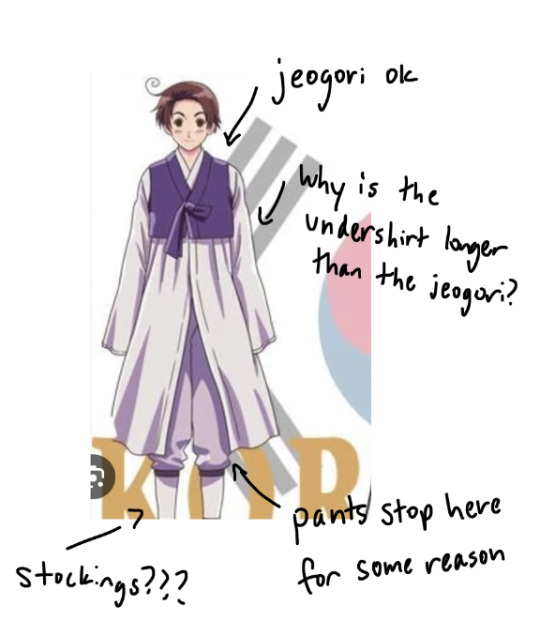
Looking at this for the first time, I felt like I was on some kind of trip. It looked like Himaruya was indecisive of whether he wanted Yongsoo to wear a durumagi or a jeogori, so he said "let's make the undershirt as long as a durumagi!"
For reference, left is a jeogori and pants outfit and right is a durumagi and pants outfit. These are the 2 main hanbok types for men.
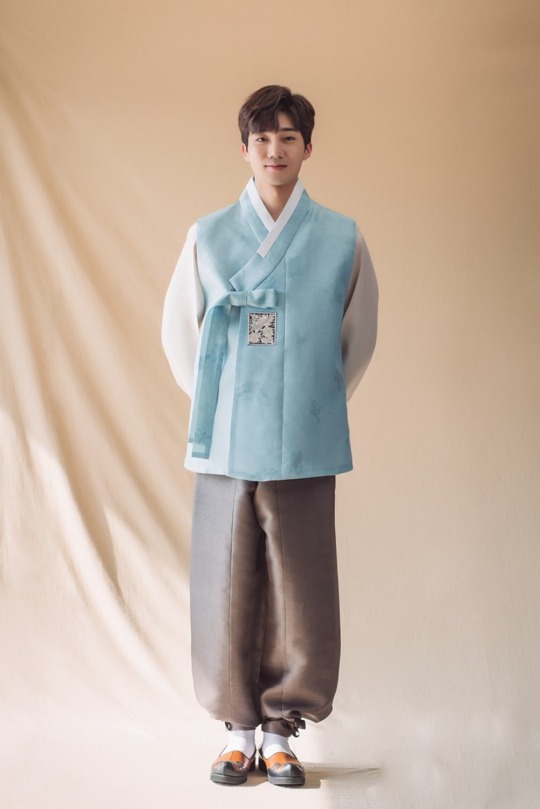
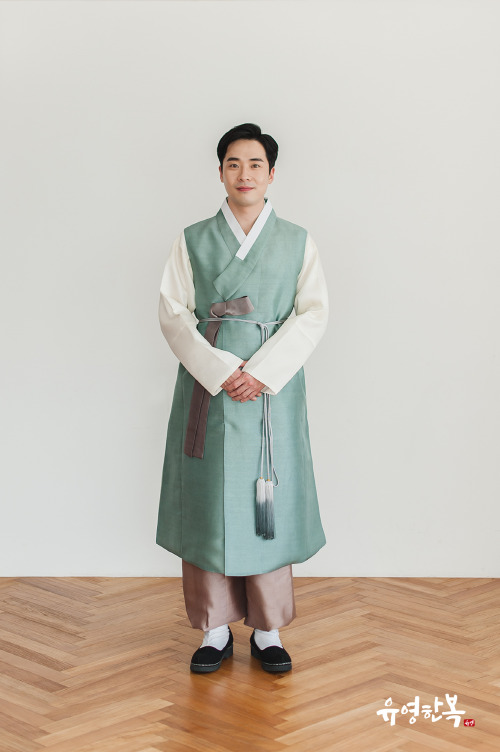
I can't think of a single character whose character design was this flawed and so inaccurately done. It's like he didn't even care or put any thought into Korean traditional wear. It makes me laugh when I see how Japan is given such accurate clothing in contrast.
His clothing is a caricature of what Korean wear is. Thankfully, I don't see a lot of art of him wearing it anymore, but when it does appear it really does feel disrespectful.
His Personality
I don't really have a problem with his energetic personality, but if you know anything about his depiction in the manga, you know what I'll be talking about:
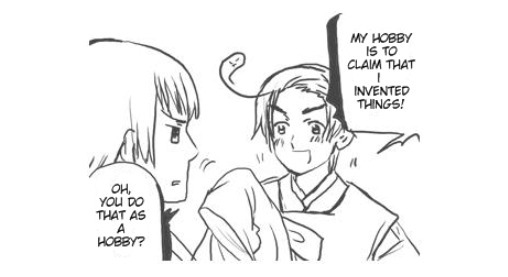
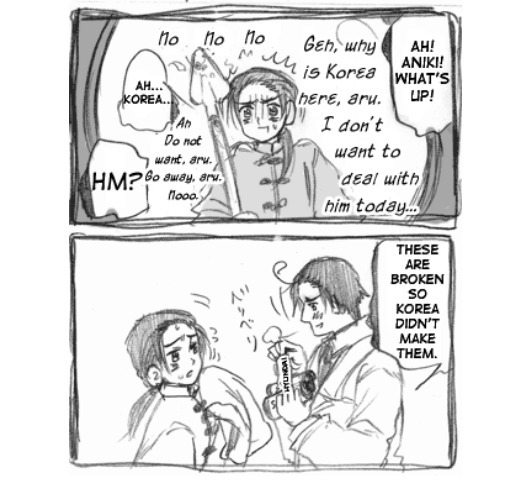
His "hobby" where he takes credit for inventions, and his weird "quirk" involving sexually harassing Japan.
What...was the reason for this exactly? A lot of personality quirks and gags of characters are rooted in some existing stereotype many people attribute to the country, like
America -> eats a lot of food, bright colored cake -> US's reputation as a country with a lot of fast food and artificially colored desserts
England -> food is inedible -> England's reputation of unappetizing foods
Korea -> claims credit for other countries' creations(Mostly Japan's), sexually harasses Japan -> ?????
This is why I don't accept some Westerners trying to brush South Korea aside "because everyone gets dunked on in Hetalia!" yes, but to what degree?
A Japanese man writing his Korean character to be stealing from the Japanese one says a lot, that Korea doesn't have a culture of its own, or most of it isn't their own. Or daresay, Korea takes Japanese culture and claims it to be their own. All three of these conclusions are problematic, and audacious coming from a person hailing from the empire that attempted to stamp our culture out and penalized those trying to preserve our culture.
The "grabbing Japan's chest" bit originates from an ongoing political dispute of an island known as Dokdo, or as Japan calls it, Takeshima. Personally, I'd agree that Dokdo belongs to Korea, referring to maps produced by Japan from the 1800s:
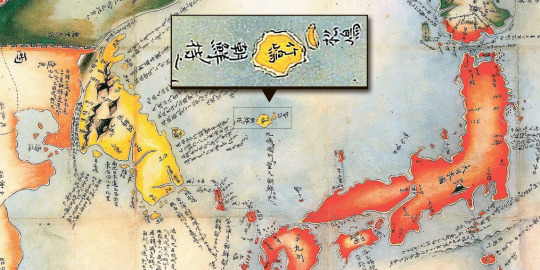
Yellow is marked as Korean land, with even the writing labeling it as "Joseon Land." But regardless of which side is correct, there is something about taking an ongoing territorial dispute(it was a much bigger issue while Himaruya was writing Hetalia) and applying it with the context of "haha he grabs Japan's chest."
It paints Korea as unreasonable and a sexual assaulter so that Korean grievances against Japan can be dismissed. Additionally, both countries have a rampant sexual assault issue(my phone's shutter sound cannot be turned off–a feature of phones only made in/for Korea and Japan), which is why it's also insensitive to give this trait to Korea and make light of this sensitive topic, while also...not extending this to Japan.
Let's not mention making Korea the harasser given the history and Japan's position too. Korea's red light districts and sex/entertainment industry was started by and formalized by the Japanese occupation so they could exploit Korean women.
"Korea had been a Japanese colony since 1910, and the proximity of colonial Korea to Japan, its established colonial bureaucracy and transportation network, and the presumed “cleanliness” of its young female population meant that likely the largest percentage of comfort women came from Korea. Another reason for the large numbers of Korean girls and young women in the comfort women system was the well-developed state of the Japanese colonial sex industry in Korea and its networks of human trafficking. This industry, which had been growing with Japanese encouragement since the late nineteenth century, blossomed under the Japanese colonization of Korea (1910–45) and provided networks for obtaining and trafficking sexual slaves." - Music and Dance in the Japanese Military “Comfort Women” System: A Case Study in the Performing Arts, War, and Sexual Violence by Joshua D Pilzer
Now, the "claiming everything is Korean" bit. The whole gag is Korea is delusional haha look he's claiming something Japan made as his!! While Japan is just looking at him like "ok...sure..go off whatever ig." Again, making Korea to be an unreasonable childish character while Japan is mature and just trying to get along, let bygones be bygones! Look at the sassy child I have to deal with guys!!!
Speaking of "sassy child..."
Korea's age
I haven't checked the wiki in a hot minute, but there were 2 details of his age I remember.
he's 15
he was "born" 1945(liberation of Korea from Japan) or 1948(Creation of South Korean govt)
This would be contrary to even the manga, as it references a painting by a Japanese artist in the 1700s of what he assumed were Joseon messengers stealing chickens during their mission to Japan. Korea was alive then as depicted in the picture referencing the real one, so it's safe to say his existence should predate even 1945.
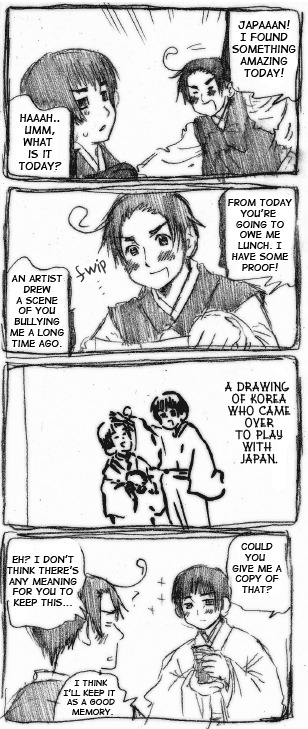
(Interesting to note that Himaruya says that Koreans interpret it as Japanese bullying the Korean envoys, when Korean sources actually suggest it could be children playing around.)
Even if Korea was set to be born 1945 or 1948, it doesn't do us justice. Why do we not have a history before colonization? How is it that Korea could be even younger than America, when the Joseon Dynasty was established a century before Christopher Columbus reached America in 1492? How is it that Japan gets to be older and Korea doesn't?
It's glaringly obvious, but Korea's "childish, immature personality" stems from Japanese imperialist rhetoric of Koreans during the Colonial Era, of people needing to be civilized.
"In April 1919, Baron Goto Shinpei (Home Minister, 1916–1918) addressed a luncheon attended by US Treasurer John Burke. Goto contended that Japan did not act duplicitously in 1905, but instead, “with the full cognizance of the United States government.” "He added, “under the efficient government of Japan, the Korean people rapidly advanced in civilization and enjoyed the blessings resulting from the development of productive industry, as well as the spread of education." - The March First Movement in America: The Campaign to Win American Support by Brandon Palmer
The most important thing to remember in all of this was that during the time of Korea's controversy, Anti-Japanese sentiment was still quite high because of the unhealed wounds as a result of 35 years of Japanese Occupation. When you think about your colonizer making a personification of your country and depicting him as
-someone that copies from the colonizer and harasses them, a contrast to the "mature" colonizer
-someone with barely a history before the colonizer
-someone who's clothes are so wildly inaccurate
then wouldn't you too be enraged? This is what caused the National Assembly to ban the official airing of the anime, and official releases of the manga. You'll notice even these days Koreans are hostile towards Hetalia, even as the incident happened years ago, whereas the Countryhumans had a large Korean following and creators, because one of them was openly treating their country like a personification from a political cartoon found in a 1920s Japanese newspaper, and the other was fan created.
I hope this perspective was helpful in explaining why certain qualities of canon are disrespectful. Please remember before defending "canon" Hetalia, Hetalia is made by a Japanese author who was found to have been on Japanese right wing forums. Don't try to convince a Korean that his depiction/canon of Korea is respectful.
#hetalia#aph south korea#hws south korea#aph korea#hws korea#im yong soo#I might edit this a bit later hmm#its 4am LOL#or I'll make a part 2?#but these were the 3 main things I wanted to explain. maybe I'll go into detail later about how people refuse to learn about korea#other than from canon and classic stereotypes of “Kpop nerd gamer”#do you like korea or the caricature#let's see if I have time to sleep lol
200 notes
·
View notes
Note
I've been thinking and I've come to the conclusion that it wouldn't make much sense for Bruce to neglect one of his children.
Think about it, in canon, most of the mistakes he made that ended up harming his family were either because he was completely buried in work, or because he was slightly manipulated, both by the narrative and by third parties.
In addition, he also cannot fully communicate with others, both because of his early trauma, the loss of his parents, and all the loneliness caused by the grief he went through growing up. Not to mention the years of self-discipline and training he went through to become Batman. From everything he's seen and experienced, and all the scars he has, I can't imagine how much that grief and and especially a sense of justice, survived.
so I don't think he would simply neglect one of his children
What I propose is; accidental negligence. Think about it, if he is busy all the time with both Batman and his other persona, Brucie Wayne, and then the justice league, investigations, meetings of Wayne Enterprise, galas, charities, other rich people, the usual rogues gallery of Gotham, etc, etc, I don't think he has much time to spend with anyone.
He is able to spend more time with his other children because they are all vigilantes, like him, and are usually just as busy as he is. Having a civilian child in the middle of this mess wouldn't do much good, especially if that child doesn't know what they do most of the time, like, y'know, vigilantlism.
Imagine everyone's absolute horror when they realize, after the p&f reader is unfortunately busted, that they paid so little attention to that child that she managed to do all these crazy things right under their noses for the whole summer. And who's to say she hadn't been doing this before this summer? How many things have they inevitably missed in her life?
What I mean is that to counter the p&f reader's luck, everyone in the batfam is unlucky enough not to be able to spend time with her. And they are aware of it.
Their guilt would be immense and the angst would be delicious.
(And it would explain how Damian hás time to spend with p&f reader, since he's a kid and his only obligations are school, socialization and being Robin, so he would technically have more time??? If that even makes sense???)
context &. context.
YOU!! YOU GET IT!!
i wholeheartedly agree!
not that "accidental" neglect is any better, it's neglect all the same and has negative consequences in so many levels. but when we're talking about Bruce Emotionally Constipated And Terrible At Communication and Could Sometimes Make Better Choices Regarding His Kids Wayne, it could absolutely happen.
i'm not one to make character analysis because i have very shallow knowledge of Batman lore, but...
like you said, all of Bruce's children participate in vigilantism. they're all extraordinary, most have horrible trauma, and have relied on him for guidance. they are all Robin, and more relatable to him, in a way. that means he's consequently more involved in their lives, more physically there engaging with them, forming an emotional bond, acting as a mentor and father figure. on top of that, like you said, he has a whole life as Bruce Wayne and Batman going on.
which brings us to neglected! Reader, more specifically mine: P&F! Reader and Vampire! Reader.
on a... financial, material level, I believe they wouldn't want for anything. Alfred is the one managing their bank account and making sure they're well-provided for and though it's fun for angst purposes, i don't think they would have a tiny little bedroom isolated from everyone in the manor, mostly because it's our favorite butler who would select which bedroom Bruce's child would be staying at in this gigantic mansion with plenty unocuppied rooms. Alfred would NOT put you in the broom closet. it would be a bedroom that's at least as big as Damian's in Son of Batman, for example.
(i more than understand suspension of disbelief and playing around with all sorts of interesting concepts and characters, so I'm not criticizing anyone!)
in fact, i think it's kinda worse that, say, you have a bedroom that's a wall across from Tim's and he still kinda forgets you exist.
also, i believe Bruce's kid would absolutely have access to a more than generous amount of money. not broke at all.
so the only type of neglect going on here is of the emotional kind. your father and your siblings have created tight-knit bonds amongst themselves based on their shared experiences and the proximity brought by them all working as vigilantes, and you're just not a part of the club.
timing is also relevant.
P&F! Reader arrives at the manor some time after Damian, which means that not only have all relationships been formed over the years, Bruce has also experienced having kids, as well as having a biological child suddenly enter his life. they're a fish out of the water, and their dad is kinda awkward about this (apparently) normal child that showed up at his doorstep. while Damian is still kind of adapting, running around at night trying to bypass Bruce's security system and solve dangerous cases by himself, P&F! Reader is in their bedroom having a virtual sleepover with their Metropolis friends, streaming movies and eating caramelized popcorn.
fun fact: Damian and P&F! Reader are neighbors. he was not happy about Alfred placing his half-sibling on the room right beside his for the longest time. P&F! Reader has definetly caught him sneaking out, but they're no snitch. and you're right, he does have more free time, and he's also on summer break so no school and no homework to worry about. He's got free time to be his sibling's keeper.
and as we all know, the impression that P&F! Reader is just a normal regular kid that totally doesn't build ridiculous thingamabobs in their spare time, it's kinda easy to forget they're there amidst the Wayne family mayhem(s). Bruce is also kinda doesn't really know what to do with this kid or how to connect with them, but they don't really demand immediate attention and seem to be doing fine – so he probably shouldn't worry too much, right?
you could also argue that he's kinda awkward (emotionally constipated) with this kid and is very bad at consoling and accomodating them after the trauma that made them have to move in with him. he doesn't straight up forget they exist, although he starts paying more attention to them after Damian gets more involved in ther bio sibling's antics. and when it comes to siblings, it's just easier for their relationship to never evolve past more superficial interactions (with the exception of Damian who decides to mind P&F! Reader's business earlier on, more or less). P&F! Reader doesn't know about the vigilantism for a long time, so it's natural that they're excluded from any and all matters regarding that. and because everyone else is so busy with their own lives and P&F! Reader seems to be doing fine, so easy to overlook, has plenty of friends in and out of their new school and the Batfam is already a formed unit... Well, you get the picture.
there's also the matter of Damian. he is the kid that "needs more attention" because of his background. he's been through a lot. nevermind the possibility that you might also have gone throguh your own fair share of trauma, at the end of the day you're the easier kid. the "okay" kid with regular problems. which is sad and unfair, but that's what we're here for, isn't it? and Dick is the biggest offender when it comes to that.
not that P&F! Reader is bothered by any of that! They have an amazing summer ahead of them. 😎 It's definetly Batfam being unlucky that prevents them from spending time with P&F! Reader, but that allowed them to mostly enjoy summer without being smothered by their family. the guilt would be unmatched, that is for sure.
"And who's to say she hadn't been doing this before this summer?"
hehe :)
vampire! Reader (she was not mentioned but I'm talking about her anyway, spoilers for the fic because i want to rant) is a different story. again, timing. she arrived at the manor sometime between Dick leaving for Bludhaven and Jason being brought in, so she didn't really get a chance to develop a deeper emotional connection with Dick. that also means Bruce was a lot younger when he is faced with a biological child being thrown at his door, not to mention the less-than-ideal-circumstances in which she came to be in his custody.
and after trying to make her his newest sidekick didn't work, in the coming years he would dedicate most of his time to fighting crime as Batman and taking care of/mentoring Jason who had a rough past and is now his new sidekick. connecting and relating to Jason was easier than connecting with Vampire! Reader, but he always made sure to check on her and make sure she was okay (and the answer was always yes, because of course it was).
during this time Jason and Vampire! Reader were actually pretty close, but then he, uh. kinda died horrifically. so not only was Vampire! Reader dealing with the loss of her brother, her father was now full-on neglecting her, self-absorbed in his grief, so she felt the proper thing to do would be repress her emotions to accomodate her father and try to be his emotional support. not that it worked, but she was there! so we have the emotional neglect and we have Vampire! Reader starting to take a parental role for her own father because he's not being a parent for her. she was also completely alone in that huge manor with the exception of Alfred because none of the other kids were in the picture yet, and Dick had long since moved out. as you can see, not very nice :)
from then on she just kinda blends into the background. financially she's provided for. she is her father's daughter, so communication and expressing emotion are not her forté, but she tries her best to connect with the incoming batkids. it does not work. i have said this before, but she is the mature child, the (again) normal one who puts other people's needs before her, so she doesn't complain when Bruce makes time for literally every other kid who becomes Robin except her. but don't be mistaken: Bruce is definetly more controlling and aware of Vampire! Reader in comparison to P&F! Reader due to reasons (guess you can say early yandere signs?). Jason too is... Sort of complicated. the situation here is definetly darker and resonates with tone of the story better. and when Bruce realizes how terrible he was? oh, boy.
so I guess you can play around a lot with the neglectful! Reader trope, and that's what makes it so entertaining. yeah. that's all I have to say for today, I guess??
#I LOVED WRITING THIS POST.#this took me out of suffering from the heat while working on the fics lmao#asks.#yandere batfam#yandere batfamily#p&f! batsibling.#vampire! batsis.#long post.#yandere batman#yandere batfamily x reader#yandere batfam x reader
288 notes
·
View notes
Text
a very common mistake people make in political/social discourse is applying individualist thinking to some social phenomenon or theory. one of the most common examples is someone responding to the theory of white privilege with “but there are poor white people” or male privilege with “I’m a man but I have no power” etc. and in order to refute that properly you have to essentially get into a philosophy of science debate, to explain that the benefit of a given social theory is its ability to be generalised above the level of the individual, that what is being described is a social process, that human beings occupy various positions within a social space (a family, a neighbourhood, a workplace, a state) that are not individual. To be able to give an account of some social force you necessarily cannot be just talking about the particularities of a single person - if you were, all you would be expressing is an individual opinion about a single person. If you want to rise above the level of ‘mere opinion’ you need to actually provide an account that is general enough to apply to multiple people of varying social situations but systematic enough to be able to differentiate between who you are and are not speaking about. Of course data are lost in this endeavour - probably best summed up by the aphorism “all models are wrong but some are useful” - but the success of a given social theory is its ability to sustain its explanatory power despite these data losses. Like the whole game of generalisation is building a theory to figure out what data points to discard and which to retain. It is no more contradictory to say white privilege is real even though there are poor white people than to say the police are a white supremacist institution even though there are non-white police officers. In fact these seeming contradictions are accounted for in these same social theories - white supremacy has had centuries of policy development at this point, it is a fairly well-tested set of logics that have adapted to a variety of conflicts, problems, and political/economic/social developments (Sylvia Wynter talks about this in the context of the post-slavery US for example). White supremacy is thus resilient to these apparent contradictions (and these contradictions generate further social developments, such as the shifting meanings and locations of whiteness), which is why zooming into the level of the individual is often not helpful in explaining its effects on a social level.
Weber says that I need not know Caesar to understand Caesar - that to talk about Caesar as a historical figure and as a particular location in ancient Roman society is fundamentally different than a description of him as an individual. And nobody actually talks about Caesar as an individual anyway! Even psychological or biographical profiles of him are premised on the fact that Caesar is worthy of this profile as opposed to any other person living in the Roman Republic. The reason we all know his name is that his place in history is extended beyond the individual. A Roman general and leader is fundamentally not an individual, not a private person. The very fact that I can say “Roman General” but not say any person’s name and have people understand what I’m saying is evidence of this. By definition ‘Caesar’ the historical figure is not an individual in any meaningful sense, he has power that is only available through social institutions and formations, and that is why he is known even today. Even the most liberal Great Man Theories of history locate an engine of history within the general position of Great Man (this is a fundamental contradiction within this type of thinking, the generalised Individual). If there can be more than one Great Man in history then he is not an individual, he is occupying a generalisable position in human history that can be calculated, bounded, and studied.
So it’s very frustrating to deal with! It’s an attempt to refute an explanation of a social phenomenon with individual anecdotes, much of which is already accounted for in said explanation. It makes many, many, many discussions about the social and political world endlessly repetitive and uninteresting, because you are always stuck at litigating the most basic, atomic point of reference. And of course that is the point for many people, they aren’t interested in any of this because they are racist and they are misogynistic and so on. It is an extremely effective derailing tactic, but part of the reason why it’s so effective is because individualism is such a pervasive mode of thinking. All of the groundwork is already laid out for people who say white privilege isn’t real because the social and epistemic infrastructure necessary to get other people to buy that argument has already been built for them to make that type of claim. Which is why the people who smirk at the camera when they say shit like this are so pathetic because they behave like they thought of that all by themselves, unaware or (more probably) deliberately ignoring the fact that they live in a society specifically built to facilitate, automate, and celebrate the garbage coming out of their mouth
#too lazy to cite directly but I’m engaging with Sylvia Wynter + Omi & Winant’s racial formation theory for the white supremacy history#And Bourdieu + Weber for the social/individual divide. Specifically Bourdieu’s theory of bureaucracy#I can scrounge up book/article titles for these if people want them I just don’t remember them off the dome#book club
262 notes
·
View notes
Note
Can you explain a sentence from your bio? "To create loving males, you must love males"? I don't understand that sentence, because like does that work for all oppressive groups? "To create loving white people, we must love white people" or "to create loving straight people, we must love straight people". That doesn't make much sense to me, especially since women do this all the time. Women always make excuses for men's behavior, give them the benefit of the doubt, are empathetic and sensitive to men and make tons of posts on the internet about male positivity and yet men still commit 80-90% of violent crimes (from what I remember). And I'm not trying to argue or anything, it's a genuine question. How is being kind to men going to bring about the collective liberation of women from the patriarchy?
So this quote needs to be understood in the context of both the book it comes from (The Will to Change: Men, Masculinity, and Love) and bell hooks' philosophy of love in general. Here's the full paragraph it comes from:
“Only a revolution of values in our nation will end male violence, and that revolution will necessarily be based on a love ethic. To create loving men, we must love males. Loving maleness is different from praising and rewarding males for living up to sexist-defined notions of male identity. Caring about men because of what they do for us is not the same as loving males for simply being. When we love maleness, we extend our love whether males are performing or not. Performance is different from simply being. In patriarchal culture males are not allowed simply to be who they are and to glory in their unique identity. Their value is always determined by what they do. In an antipatriarchal culture males do not have to prove their value and worth. They know from birth that simply being gives them value, the right to be cherished and loved.”
People often see this quote or another one and assume a lot about bell hooks' point here, but The Will to Change includes her own experiences of abuse by men and her experiences with misogyny, alongside her observations about how men in her life experienced patriarchal abuse. She is not ignorant of the harms done to women when she says this.
My personal interpretation of her words is this:
The patriarchal expectations relating to how women are expected to "love" men is very different than what bell hooks means to love. Her concept of love requires self-love and self-care, and not being a doormat or adopting a "I can singlehandedly fix that incel by being nice to him!" mindset.
And, equally, how we are taught to "love" men is not good for men either. The patriarchy promises love to men in exchange for appropriate performance of dominance. It says that there are "real men" and "fake men" and only real men are deserving of love. It says that men must be constantly fighting each other, women, and queers in order to be deserving of love and escape punishment. bell hooks' argument is that we as feminists need to see inherent worth in men as people, and reject those patriarchal notions of what makes men worthy as well as the doomerist radfem impulse to label all men as evil and sever all connection forever. Men are people, and women are people, and we are all people in society together, and we always will be, so we need to be able to work together to create loving communities. Whether men are your friends, lovers, relatives, neighbors, patients, students, etc. you do live in a society with them!!! And we (intersectional / revolutionary feminism) cannot win without them. Not just as quiet allies on the side but as meaningful co-conspirators, fellow feminists with just as much a stake in the fight as any woman.
You can read this short chapter of one of her books where she explores love ethic in politics specifically relating to race.
385 notes
·
View notes
Text
alright. i'm taking it upon myself to put something to rest.
there is a new mlvn argument on the market, and i have to say, it is the absolute most BACKWARDS, IDIOTIC, WILFULLY IGNORANT take i have ever seen from them. and it is so easily disprovable that i need to make a post about it and put it in the ground early on.


if you've been around since s4 vol1 era, then you've seen the evolution of their arguments surrounding the monologue. first it was "mlvn was love at first sight, because mike said so". they were all posting the clip from s1 ep 1 of mike finding el in the woods, clips from all throughout s1, and saying "this mike was in love with el!!" because mike said so. in the monologue. when bylers pointed out that this claim from mike directly contrasts his behavior in s1, we were called delusional and told we were just coping. i was even told by someone on reddit that mike wasn't acting like he loved her because he was afraid of being made fun of by dustin and lucas, which deserves it's own separate post, but anyways...
after what finn said at the paris con, aka this:

bylers obviously took this as a win, because it very obviously completely dismisses the idea that mike was being truthful in the monologue. because of this, mlvn's argument has shifted. now, they are claiming that what mike said in the monologue, "I knew right then and there in that moment that I loved you." was not a lie, but HYPERBOLE.
here's just a few examples of this.

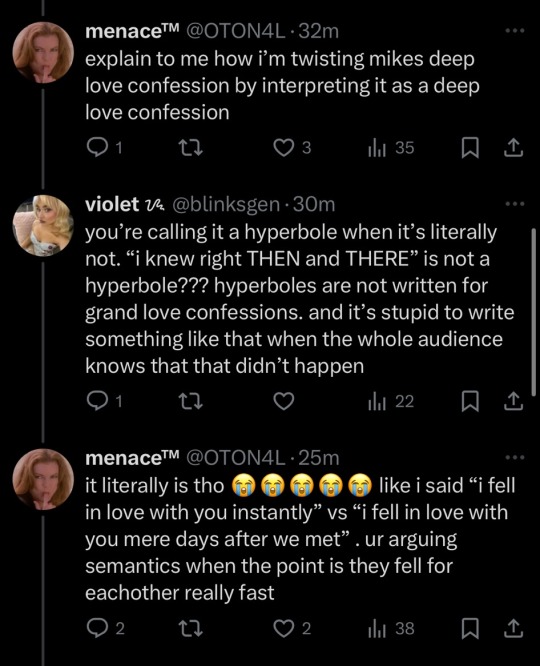
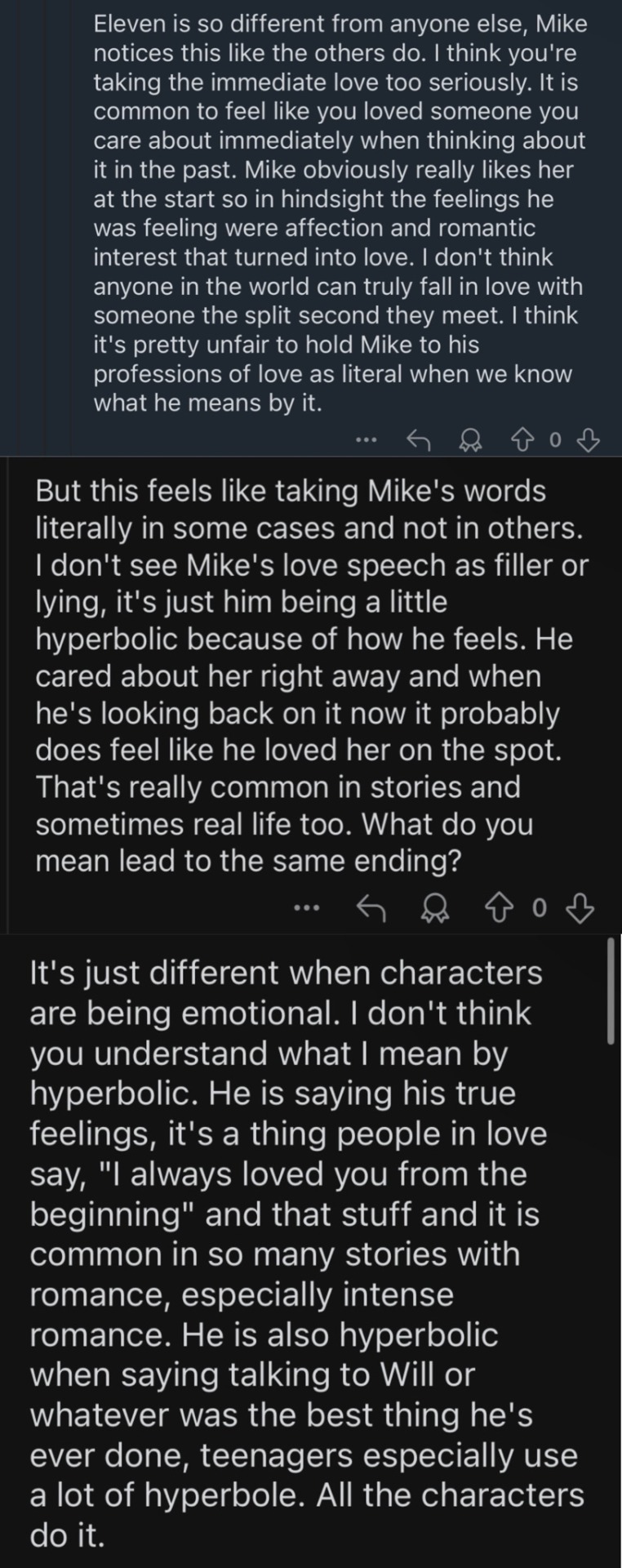
holy fuck. where do i even start with this...
i guess let me start by saying that i am an english major. i am a creative writing student. english language arts has always been my forte. it's been my best subject my entire life. i was the kid people went to for help in ELA (english language arts). i was the one tutoring my friends. i was the one explaining things to them. in college my friends would line up to get my help with their english work. i edited and revised their essays. i spent close to 10 hours a week in english classes discussing literary devices and analyzing different stories, which i excelled at.
i am not trying to 'flex', i am simply providing context as to why i believe my opinion on this is worth something. mlvns try to say being a writing/film student means nothing in this argument, but it really really fucking does. i, and countless others in the byler fandom, are LITERALLY more educated in this sort of thing than those who did not spend thousands of dollars to study it. sure we may not be renowned writers with masters degrees, but who do you think we learned from?? our professors, who ARE renowned writers with masters degrees. its no different than trusting the opinion of a biology major when talking about biology. of course ELA is more subjective and free, but when you actually study it you find that its more concrete than you'd think. there are definitions, there are guidelines, there are rights and wrongs. of course you do not have to obey those rules, but in the world of publishing and analysis there are things that make sense, and things that don't make sense.
for example. you can totally write a story where a character says "i knew right then and there in that moment that i loved you" and add whatever explanation or nuance that you want. you can write that with the intention of the character being truthful, but maybe exaggerating a bit. whatever you please. you have the creative freedom to do that whether it makes sense or not.
what you cannot do is claim that that phrase is a hyperbole in that context, or any context, because that is OBJECTIVELY wrong. that is incorrect and inarguable. there are phrases that could potentially be debated between those educated in ELA on whether or not it could be considered a hyperbole, but that would requite the phrase to have ambiguous wording. the phrase in question does not check those boxes. it is not ambiguous in any way shape or form. it's not hyperbole. it's not even hyperbolic in any way.




here's a link to an article with 50 different examples of hyperboles. i promise you that our quote in question will not be there, and that nothing on that list will be remotely similar to it.
"I knew right then and there in that moment that I loved you."
i mean you are genuinely a fucking doofus if you're genuinely trying to claim this is a hyperbole. i need you to be so fucking for real. mike is referring back to a specific moment, remember? maybe you don't because i know y'all don't even watch the show, so let me refresh your memory:
"But the truth is, El...I don't know how to live without you. I feel like my life started that day we found you in the woods. You were wearing that yellow Benny's Burgers shirt, and it was so big it almost swallowed you whole. I knew right then and there in that moment that i loved you. And I have loved you every day since."
el even has a flashback to that exact moment in the scene right after he says it, and right before he says "I knew right then and there etc..."
he literally starts it off with "The truth is"

not meant to be taken literally.
would it make sense to say "The truth is, I'm so tired I could sleep for a century." or "The truth is, I'm so hungry I could eat a horse." or "The truth is, I'm dying of laughter."
NO! IT WOULDNT!
mike's monologue was written/approved by the duffers. the same duffers who graduated from a very prestigious film school and created the biggest tv show in the world. they know what a fucking hyperbole is and that you don't preface one with "the truth is". it is genuinely ridiculous to suggest that they let that stay in a scene where a character is supposed to be finally revealing the truth to both another character and the audience.
let's circle back to those screenshots of dumbass mlvns cosplaying as ELA students
"i fell in love with you instantly" vs "i fell in love with you mere days after we met . ur arguing semantics when the point is that they fell for each other really fast"
please tell me, in WHAT fucking world does someone say "I knew right then and there [in the first moment I saw you] that I loved you" when trying to explain that they really fell in love a few days later. and in WHAT UNIVERSE would a WRITER choose to have their character, who is supposed to finally be telling the unfiltered truth, say that. the answer is, there isn't one. that is so fucking backwards and idiotic that i can't believe i'm even having to explain why. the monologue is fabricated. it was written and approved by professional writers and directors. if mike fell in love with el at some later point in s1, or realized it at some later point in s1, then he could've just fucking said that. he could've just told her the moment he fell for her or the moment he realized. they didn't have to make it all twisted and confusing for no reason. he has absolutely no reason to lie or exaggerate (if he is straight and in love with her).

DING A LING A LING A LING!!!!! THATS A BELL!!!!!!!!!!!!!!
"this feels like taking mikes words too literally"
oh, my apologies for taking his words literally during a fucking CONFESSION OF LOVE that he gave her while she was DYING. sorry for taking a line prefaced by "The truth is" literally. you are totally right and i will never do that again!
"when looking back on it it probably does feel like he loved her from the start"
cute sentiment, but that's literally NOT WHAT HE SAID. for the millionth time (see how i just used a hyperbole in a place where it makes sense? where i didn't preface it by saying it was the unfiltered truth?) he said "I knew right then and there in that moment that I loved you." he is saying he saw el in the woods in the rain in her yellow benny's burgers shirt, and KNEW he loved her. he realized it in that moment. that is what he wants el to believe. he is using specific language to pin point the moment he realized it on that moment. like im so serious when i say that if you try to say anything else you genuinely have worms for brains.
any way you logically look at this, it is crushing for mlvn. even if it was a hyperbole, which it is NOT, why the hell would the writers have him exaggerate his feelings to cater to her when it would be much more meaningful for his ACTUAL feelings to save her life?? why would mike feel like he needed to exaggerate?? and i'm sorry, i dont buy the heat of the moment bs. mike has nearly lost el multiple times because he kept lying to her. they had a bad fight days earlier because mike wouldn't tell her the truth. so he finally gets another chance to tell her the truth, and he EXAGGERATES?? HE TELLS A WHITE LIE??? that would also be crushing for mlvn. but none of that matters, because it's not a hyperbole, it's a lie. a flat out lie.
let be me clear, that does not make mike a bad person. in fact, it actually makes him an incredible, caring, selfless person. (remember the synopsis for s4 ep9? "With selfless hearts and a clash of metal, heroes fight from every corner of the battle field to save Hawkins ---and the world itself.") he lied because he knows he doesn't love el the way she wants and he feels like his actual love for her (which is platonic) would not be enough to save her. he devalues his own feelings because they are not what el wants. this is why he nodded after will said "It's scary to open up like that, to say how you really feel. Especially to people you care about the most. Because...what if they don't like the truth?" he feels like he owes el the love she wants, and he is willing to lie to her if it means saving her life. because he truly does love her and care about her, so much that he will do whatever it takes to not lose her.
and i know a lot of mlvn's devalue literary/media analysis and english/creative writing, and our opinions in general, so in case all that wasn't enough, i also asked mlvn's old friend about this. their friend being AI.
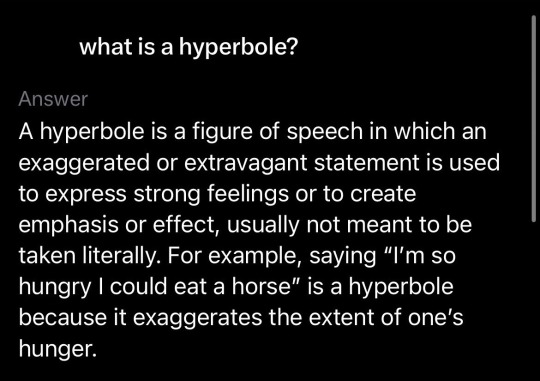
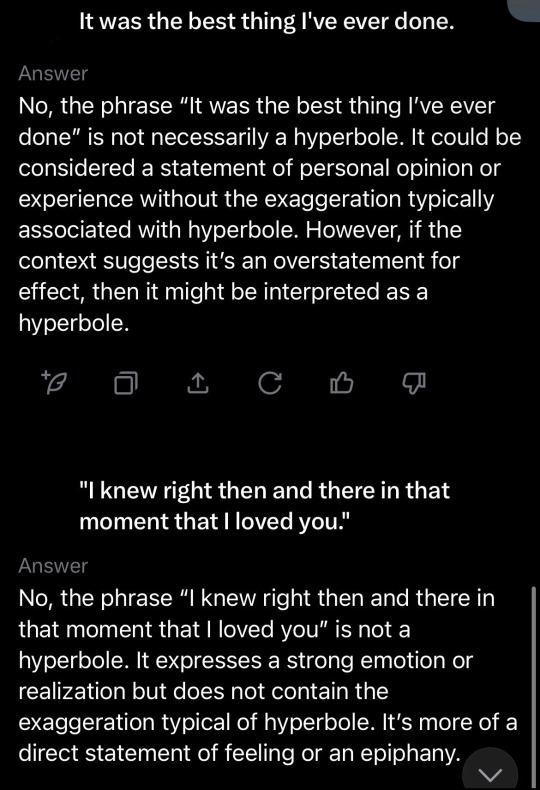
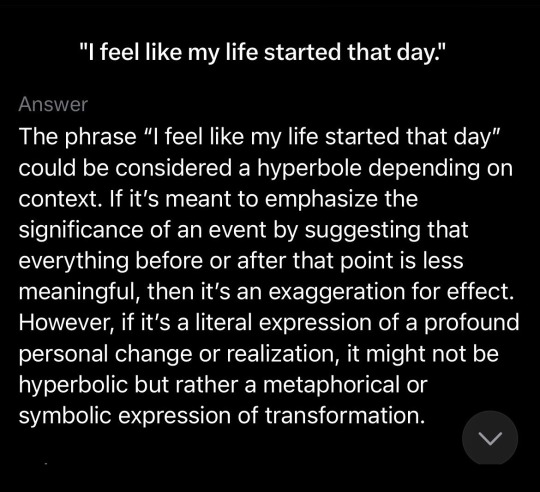
mlvns, everything with a lick of sense, including artificial intelligence, is proving you wrong. you are incorrect. what finn said at the paris con put the nail in your ships coffin and you know it. so please stop embarrassing yourselves on the internet and making dumbass claims like this when you know nothing about the subject. you look stupid.
this rant isnt just coming from a place of byler truther anger, it's english major anger. LEAVE MY SUBJECT ALONE. PLEASE.
#byler#stranger things#will byers#mike wheeler#byler endgame#byler analysis#stranger things 4#anti milkvan#milkvan is bones#anti mileven#mileven is bones#stranger things analysis
174 notes
·
View notes
Note
Just read Malleus dorm uniform vignette because I got his SSR to build a better cosmic team. All i have to say was Malleus neutral but now I'm a hater.
Like wtf. He's so incompetent.

Aaaaah, I see 😅 Not a fan of those vignettes, huh??
I have my own share of problems with them (like how the groovy has so little to do with the context for it), but let’s be fair to Malleus here 💦 He’s sheltered, comes from a country that is very anti-human, and is so OP he primarily relies on magic to solve his inconveniences; it’s only to be expected that he doesn’t know the proper etiquette when interacting with his fellow mages. Now, was it rude for him to do what he did—even if he didn’t know any better? Absolutely. He made a major faux pas here. Is he acting rude intentionally? No, it’s for sure out of ignorance.
I think the major issue that some (myself included) take with these vignettes isn’t that Malleus messed up or that he is ignorant that he did, but that he doesn’t really apologize for it and doesn’t try to learn from the experience even though this is clearly his big issue. Instead, he leaves confused + not fully understanding why what he did was wrong. Sure, he resolves to “be better” next time + swears he’ll continue to learn more about humans but like… why can’t he do that now? Why is he putting it off to later??? Why doesn’t he take the time and effort to try and understand why he was perceived as being so rude?? Malleus even closes the vignettes by saying it might take 100 years to come to a mutual understanding… when he didn’t truly listen to what his fellow dorm leaders said to him to express their upset and explain why they were chastising him. It’s not wonder it’s going to take him so long to learn; he barely seems to pay any mind to the people in front of him literally telling him what he did wrong and why (even when it’s coming from Lilia, someone he respects). He’s so fixated on his own mindset that even when others try to show him their perspectives, he cannot really… see those perspectives. This is a cycle that repeats, a character flaw of Malleus’s, and while it’s not wrong to have flaws, I can see why this particular flaw can be irritating and unappealing to some fans. (That’s definitely the case for me 😅)
#twisted wonderland#twst#disney twisted wonderland#disney twst#Malleus Draconia#Lilia Vanrouge#notes from the writing raven#Malleus dorm uniform vignette spoilers#Malleus Draconia critical
133 notes
·
View notes
Text
"But the artist said that this is about..."
In college I was a creative writing major and I do think that it was beneficial. It will not automatically make you a better writer or help you get published, but a good program will give you some tools and skills that can help you if you actually show up for them. One of the best things about a creative writing program is the workshops, which can also be the cruelest part of the program, the reason why most people drop out, and the thing that produces the most tears.
Everyone has a designated workshop day where the subject of the class will be whatever work you submitted and everyone read the day or so beforehand. The entire class period is about discussing whatever it was that you wrote and only what you wrote. You do not give any context when you submit the work; you just submit it and everyone tears it apart the next class period.
But the most important thing about these workshops is that the writer has to be present, but they cannot talk. You cannot explain yourself. You cannot argue with criticism. You cannot provide context or meaning behind what you wrote. You have to sit there and listen to what a dozen or so other people took from what you wrote and what they felt was good and bad about it.
This is a good thing. It forces you to grow a backbone and take criticism but it also really, really incentivizes you to learn how to put what you actual mean into your writing and do it well.
And this isn't just about learning how to take negative feedback, it also shows you that people can take your writing in very unexpected interpretations. Not bad interpretations, but things you definitely weren't intending when you were writing.
My intention for writing this, is to explain that the first things you learn when learning both how to take and to give criticism in an academic setting is that artist intention does not matter. What is actually presented to the audience and what they get from that is what matters. That isn't to say you have to appease the audience. If everyone is frustrated and is complaining about it and you wanted to do that, then mission accomplished. You don't have to accept all the criticism you're given, but you have to learn to distinguish what is your ego and what is actually beneficial for what you want to do with your piece.
Now, there were times when we would actually ask the writers small questions. Usually after the workshop was pretty much done and it was honestly usually when the writing was actually good and there wasn't much negative to say about it. More questions about like what it was inspired by or what was the thought behind certain choices or why things were written a certain way. It was more out of personal curiosity than it was to inform how the critique went. It was from people wanting to learn more about how this was made, not people wanting to know how to feel about it.
All this to say, I do find artists talking about their art very interesting, because I'm someone who likes art. I like to know how art is made and how artists think and what drives them. It will never or should never definitively inform how I interpret their art, however. If I take a piece a certain way and then learn that the artist actually intended something else, that might make me look at it a different way. It might make me see and accept their interpretation, even. But art is not one final sum. It is multiple things at one. My original interpretation isn't any less valid or true even if its in direct contrast to what the artist intended from it, and even if I also accept their intended interpretation. With good art, multiple contradictory things are true at once.
Anyone who thinks a piece of art can only ever be or say one thing and cannot contradict itself is not actually thinking about the art as art but as product to be consumed and disposed of.
70 notes
·
View notes